#that kind of environment is so unlike what I’ve personally experienced that it’s hard to wrap my head around it not creating resentment
Explore tagged Tumblr posts
Text
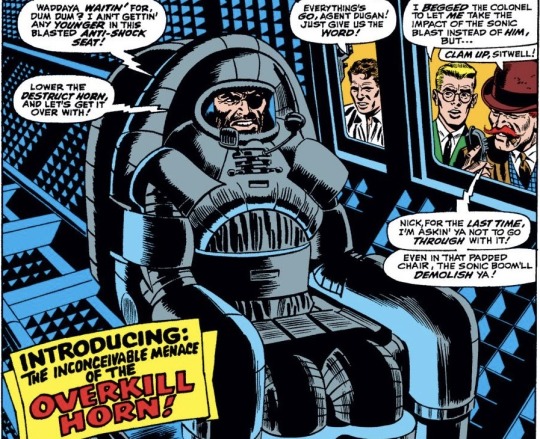
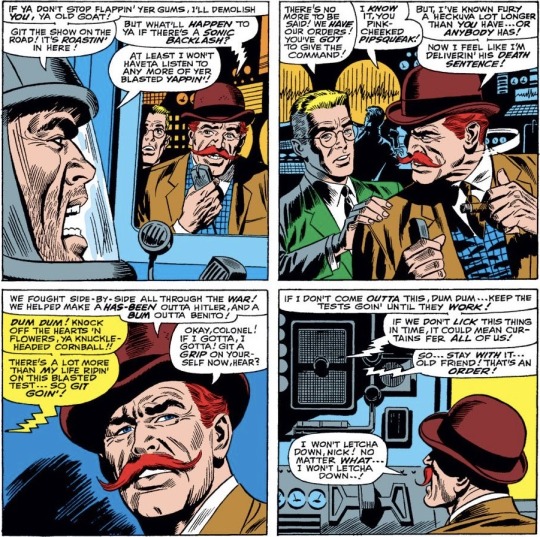
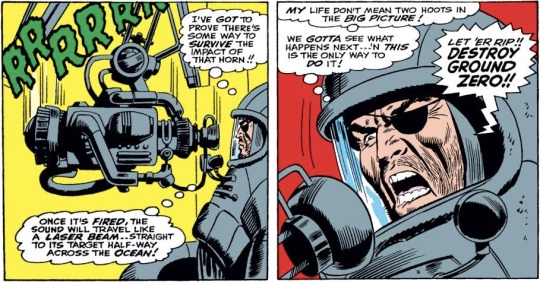
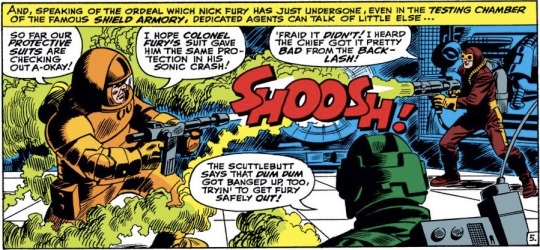
Strange Tales (1951) #150
#I’m currently into military settings#it’s interesting to me that these are really Nick’s friends but he has the authority to give them orders#particularly that Dum Dum would go through doing what he feels is giving Nick a ‘death sentence’ because Nick ordered him to#but then also that Dum Dum would risk his own life to safe Nick from that situation#which Nick caused#that kind of environment is so unlike what I’ve personally experienced that it’s hard to wrap my head around it not creating resentment#and young Jasper wanting to risk his own life in the place of Nick’s#while Nick feels that ‘My life don’t mean two hoots in the big picture!’#makes it even sadder that Jasper ultimately died sacrificing his life for Nick’s#that sentiment from Nick that his life isn’t that important isn’t new-to-me in 60s-era Nick comics#both S.H.I.E.L.D. and WWII-set#but I assume that’s a feeling he grew away from as he ran S.H.I.E.L.D. for longer and longer#and become more embedded in the U.S.’s security organizations#marvel#nick fury#dum dum dugan#jasper sitwell#my posts#comic panels
0 notes
Note
To throw my hat in the ring, having nice representation as a system would be cool and nice, but uh…
Can someone point it out to me where it’s been done?
Because I’ve had people use:
- Possession
- Alter Egos
- Personifications (Sanders Sides style beat)
And call these good representation of systems.
And with DID/OSDD the medical side is still arguing over how it presents.
And liebes experiences vary.
Like I’ve seen and heard things which made me :/ because everyone is looking to make a good representation.
They see multiple people sharing a body- from a trauma disorder mind you- and try to replicate that.
And don’t get me wrong I’d love the representation but if you’re doing DID/OSDD then you’re making a very complicated, traumatized set of characters that all inhabit the same body, of which is caused by the upbringing and environment of the child.
Which it isn’t even just research then, it’s a complex map of cause and effect that takes as much worldbuilding as like, magic systems or governments.
But unlike those, there’s not a simplified version.
And given that people have a hard time portraying PTSD, schizoaffective disorders or even personality disorders right without like, stigmatizing it, because they don’t have it, I just find it :/
Systems can’t stop you, and Kevin- as well as the rest of the system- isn’t going to stop you, there’s a lot that goes into these kinds of characters and it’s not simple at all.
“How do I write this character” is so incredibly hard for anyone to answer.
Because from trauma disorder side, it’s a complex trauma disorder that has so many factors.
And that’s not even getting into the good representation part. Personally it’s just easier to focus on other parts of representation, and should it come about, read what systems make on characters that are systems.
Kevin and them can’t answer the question of if you’re doing it right without actually getting to see your work and well, even then you’ve designed the character and implemented them.
And the fact xe mentioned how xe doesn’t like the idea of singlets writing systems before, and now is just a boundary xe’s setting, you don’t have to listen to xem, but like, just, acknowledge the boundary?
For writing representation anyways, you just do what you would do for writing about any other group.
It feels weird being asked, “how do I write about your diverse group better?” And I’m sure Kevin agrees with that.
yeahh basically all of this. its a loaded question and im just a dude man. if you got questions abt making a system OC, go send an ask or msg to Drake bc he is wayyy more experienced w this shit considering he's an actual writer. this is his jam, go ask him. I'm just an artist.
78 notes
·
View notes
Text
Ongaku to Hito 2018/11 - 京 interview
If anyone is curious as to why I do not post word-for-word translations usually, here you go hahah. It is so horrible but hey, it was a short interview and not all of the translated sentences are awkward, so perhaps you can still gain something from reading this. You can still sense the poignant nature of Kyo’s statements. Somebody asked me to expand on the notes that I had posted back then.
- What have you heard from people who listened to the new album (The Insulated World)?
I haven't heard anything. In the first place, there are probably no people around me who have listened to it outside of interviewers.
- Don't you care about how the listener feels or reacts?
These days I don't care. It can't be helped if you care about that one by one (?). I just consulted with Kaoru-kun and asked him when to work on the next single.
- You're too quick *laughs*.
I want to move forward to the next (project).
- You talked about the whole album in the latest PHY volume, but now I want to focus on the theme of the new album. I think this is the first time that your feelings are expressed so specifically.
It wasn't a conscious decision, but maybe this is the first time that the album has such a high concentration of those songs. Up until now, albums maybe had two or three songs like that, but it isn't a first.
- Not only the words, but the content that you sing remains consistent.
Up until now, if an album had 10 songs, I would write them with different messages and perspectives. It was the story type and balance that I was aware of in the albums. Now, it's come to feel clever.
- You wanted to leave more to the instinct?
That's right. I also like the pictures that I draw with more scrutiny, but isn't it more powerful to follow the momentum of a single brush stroke? Is that the kind of thing I want to do now?
- Which type do you think is yours? Do you do it with concentration or do you leave it to the instinct?
I don't know, I can't view myself objectively. I defer to how I feel in the moment. Sometimes, I want to do it in detail and sometimes I want to do it in a single stroke. I don't know if it's a cycle or why it changes.
- You can't control that sensation.
Or rather than saying that I can't control it, I don't think that I would do it. Usually, after such a career, people in the music business think "that's my individuality" and they settle into things that they are comfortable with. But I don't like that. I feel like I'm alive by sticking to something called "my individuality".
- I think that there are people who think that "the strength is consistent from beginning to end".
I think that it's cool if someone sticks to that personality, but I don't want to be that way, because I'm not satisfied with myself at all.
- You also mentioned that in the previous interview.
Yeah. My anxiety towards myself only increases as I get older... I think that I would be very desperate if I met myself when I started playing in bands. Something like: "Huh? Seriously? Is that so?"
- Is it that painful?
Maybe if I looked at myself now, I would think that I stopped being in bands. Saying: "It's that tough? Well then, let's find something else."
- However, this new album contains poetry from a person who suffers from such anxiety and despair. If it were someone in their 20s, it could still feel unripe, but it's a mature adult who is still suffering like that because he cannot recognize himself.
That's right.
- So we can come to terms with ourselves somewhere, live normally. But since it's Kyo-kun, you can't.
That's right, I can't. For example, I think that a lot of our fans are also getting older together, everyone will grow up. Whether it's at work or in a home environment, growing up in such situations, we don't say that we are worried or that it's tough.
- You simply start coming to terms with it.
Looking around, what I'm singing right now, I don't think that it can be understood very much. Like, "Is that person still saying this?" Actually, when I've overcome that kind of self-consciousness, the lyrics that I write are better. I'm sure that it will connect with adult fans. But I think... to me it remains impossible.
- I think that it's understandable that fans sing here enough.
No, I think that there are various people. I think that those who can't connect will ever connect at all. So if I wanted to reach those people from the beginning, I wouldn't have written (those lyrics).
- You're not looking for empathy, from the beginning.
That's correct. As early as the first phrase of the first song, could it be done for real? I couldn't do things such as aim at the bottom or seek for people to sympathize with me. You can only sell yourself. As that feeling passes through the years, it becomes sharper. It feels like my real self is getting cornered more and more.
- How do you feel about people other than yourself who produce music and lyrics similar to yours?
I wonder... I don't know, but I'm probably happy. There are a lot of people who do what I do, but it's all fabricated or similar to lies. But if there's someone who really does it with pure feelings like me, I'd say "I wasn't the only one" and we would connect. Even if it's a misunderstanding.
- Maybe if you find someone with an existence similar to yours, you won't deny yourself that much. But you haven't been able to find such a person. That's why you wrote those songs in the album (The Insulated World).
Isn't that so?
- In other words, what's revealed in those songs is that you feel lonely within yourself. And you're giving up and coming to terms that it's something that will never go away.
The loneliness... It will never disappear. That's my biggest problem. No matter what I do or with who, I'm always lonely. I think that everyone feels some loneliness, but I wonder if everyone is living with loneliness like this? I'm always lonely like that.
- You have many feelings of being the only one lonely like that?
I don't know. Everyone has felt lonely and I think that they may have experienced something similar. But, everyone... Do they keep living with such loneliness? Do you hide your loneliness and take a peace-sign photo or something? That, it seems that you have a strong heart. Because personally, I can't do it.
- You think that this kind of person is strong?
I think that they're stronger. Even if they are lonely, they laugh and try hard to move forward. I really admire them.
- I don't know if it's strength, because they might not see or feel that loneliness.
You can't pretend not to see it. It's in here *hits chest* all the time. Even if I try not to think about loneliness, right here *chest* that's the scene that can be found. It's tough.
- To compensate these feelings, people could lean toward drinking alcohol, finding a girl, or going to live shows. In Kyo-kun's case, how do you fulfill this?
My job.
- Hahahahaha
Since you know how much work I do, I think that you can see (what I mean).
- But work... It can be lonely too *laughs*.
But at the moment I feel like I'm alive only by working, or being involved in bands and music. So I'm still happy with this kind of work.
- It's really like you said.
When I say my work, isn't it remaining in shape and expressing myself? So only when I'm working, the loneliness is filled. I can't do that elsewhere. Even if I go hang out with someone or something like that, nothing remains... The feeling of emptiness afterward when I come back and am alone again is out of this world. Somehow all alone.
- By the way, it's something that you said before. Even if you hang out or drink with everyone (in the band) after, you feel yourself becoming cold.
Right. By the way, I went out to eat with the other band members for the first time in a long time. We've known each other for a long time, but me, I didn't know what to talk about.
- Why?
I don't know. But when I eat with a band member whom I've known for 20 years, it's like that. Everyone was talking in a friendly manner. Somehow... I'm jealous. In those times, when I see people who are having fun, I feel very sad. Like, why can't I just enjoy myself?
- You can't force yourself to enjoy it?
It would be fun if that was possible. But I can't do it, at all.
- What do you feel would happen to you if you didn't have a way to express yourself?
Hm... What would happen. I don't know at all. Would I not be doing strings of 100 posts on Twitter a day *laughs*?
- Hahahahaha
I feel like I would spew out all the bad things. But I don't have to do that because of my work. I do almost everything from home. So, that's going in the right direction for me. I'd say it's not bad at all. But, the loneliness is here all the time. It will never disappear.
- I was wondering if you would get some balance of mind by doing sukekiyo, but what would you say about that yourself?
Due to the wider range of expression (more songs and different atmospheres), I think it's really good because the songs can be released immediately. But... unlike in DIR, all the members beside me are juniors, so I bear a sense of responsibility, right? I found it a little difficult.
- Right. I thought that you would evolve and find balance by carrying the band sukekiyo and find it easier to live.
It doesn't change.
- Yeah. That's what you are trying to convey in this album, trying to find people like that, especially with the song Followers.
I agree. For example... If I say anything about myself, I suppose that there is one person who understands everything. It seems like I'm going to be the least hurt by going to a place where no one knows me and that I live self-sufficiently, like with that person. I feel it's the only way to live the happiest though...
- But I think that there isn't anyone like that.
I know that. Like the sense of unity in a live show, I'm always looking for something that seems to be visible and invisible. I knew it was an illusion a long time ago. Even though I understand that, I don't want to give up. If I give up there... I feel like I would break.
- That's why you've got songs like Followers and Ranunculus here.
Right. No matter how much despair I sing, I still want to see the light. I want to sing towards that. If we stay only in the darkness, we wouldn't be able to move forward anymore.
- Both songs are (laid) bare, aren't they? Up until this point, I think that you were getting ready to make songs on such innocent feelings.
But in order to make people believe, isn't it necessary for me to have laid myself bare so far? If you try to hide it even a little, it wouldn't be believable. Of course, by exposing myself so far, I'm scared to get hurt in the end. If I open the lid, then maybe only one person is waiting for me there. But for me, that one person is important.
- You've really always been looking for that one person, isn't that right?
If really, I can convey 100% of my thoughts to that one person, then I don't mind if someone else attacks me. Feelings exempt of impurities, that's what's important to me.
- That person is why... But I want you to be happy.
But if I become happy, there would no longer be an artist named Kyo. So... It's a cruel world. *laughs*
#yeah some of my initial notes were not very accurate upon review#I am so bad especially with the lack of pronouns#having to guess whether they mean I you they or we#no accuracy claimed#Dir en grey#京#Kyo#interview#translation#The Insulated World#ongaku to hito#音楽と人#magazine
59 notes
·
View notes
Note
Hi Pom💙 This is kind of a weird thing to ask and if you don’t wanna answer I completely understand.
What was your experience with getting diagnosed with autism? Was it hard, did you get diagnosed late, or misdiagnosed? The reason I’m asking is because I’ve been suspecting I have another neurodivergency besides dyslexia (most likely autism and/or ADHD). According to my mom, when I was getting diagnosed, the lady or whoever was diagnosing me said that I didn’t have autism (and my best guess is that they said I didn’t have anything else) but I have a really hard time believing that. I show a lot of traits that do with both experiences (hyper fixation, picky eating, eye contact issues, stimming, the list could probably go on) and it’s hard to believe I don’t have at least one. I know that autism and ADHD is harder to detect in women and I also heard about something called “masking” (which I’m pretty sure I do) so maybe that’s why? Or maybe I’m just a alltistic trying too hard to figure out what’s wrong with myself, idk. I want to talk to a therapist about it but 1) it’s kind of hard to talk to my mom about that stuff and 2) I’m pretty sure she’s ableist and would specifically tell me and my siblings not to do things in fear of people thinking there was “something wrong with us.” I try to talk to my friends about it but ofc, there neurotypical-selves water it down to “everyone does that” or “I do that” or something to ignore my feelings (not shocking bc they don’t like to hear about the things I’m interested either way and I usually don’t tell them because I feel like I’m always annoying them). Anyways, thank you for reading my half question/half rant thing💞. - 💌
Hey friend! I actually get this question more often than people probably think, lol. Unfortunately, my answer is a bit disappointing for many because I went through this process when I was a toddler. I wasn't late diagnosed, I've known since I was a child that I had a moderate developmental delay that was — not much later — labeled Autism. That being said, I have general advice and things to consider.
I think it's great to explore yourself and self-reflect to learn more about who you are and what identities you might possess. However, there is also a tendency as of late to conflate basically all neurodivergency together (not by you, but I'm afraid about the misinformation I see running rampant about what qualifies as an "Neurodivergent" trait). This becomes a problem because there are a few defining traits and features of each disorder, and it's virtually impossible for the person experiencing them to be able to distinguish most of them.
Also unfortunate is that most (good) psychiatrists will require testimony from your young childhood in order to establish a diagnosis. A lot of the distinguishing characteristics are most prevalent in the years you won't remember, which is why late diagnosis is so difficult. This means that, if your mother is unwilling to testify truthfully, a formal diagnosis is going to be a steep uphill battle for you. An expert and a family member are typically needed for a diagnosis, which leads me to my second and most important point.
Consider why you want a formal diagnosis. I've noticed a horribly unsettling trend where people are dramatically underestimating how much that piece of paper can affect your life. Your reliability, your parenting ability, your driving ability, your ability to get a job, your success in academia, your ability to immigrate to other countries, can all be affected by a formal diagnosis.
Autism, unlike more mainstream disorders like ADHD and Dyslexia (both with rich communities and unique struggles), is heavily stigmatized. You have a much higher risk of discrimination than the others. I don’t say this to be all oppression Olympics, but because it’s very important to consider whether you want to open yourself up to that specific brand of abuse.
It sounds to me like you feel that your environment would not welcome a diagnosis even if you had one. I am here to assure you that if you feel that way, it’s unfortunately probably true. That piece of paper does absolutely nothing to make people suddenly start caring or wanting to help you. In my experience, it’s usually just handing them another weapon to use against you.
The sad, upsetting reality is that people who don't believe won't ever believe you, no matter who else agrees with you. And I'm really sorry they are like that. You deserve better. You deserve people who care about your comfort. But I worry that people who seek out a late diagnosis for their own peace of mind are opening themselves up to more harm than they are anticipating.
For these reasons, I tend to only suggest people get a diagnosis if they need formal accommodations. For me, I needed a diagnosis because I was being put in SpEd, I was non-speaking for a decent amount of time, and I needed speech therapy when I did start speaking. As soon as I stopped needing accommodations, my family stopped telling people. Most people in my life have figured it out themselves or just write off my behavior as "quirky" or "odd."
As for masking, I think that's something that is essentially impossible for you to know if you're doing it (well). The idea that any disorder is "unique" for a specific gender has also been mostly debunked, because it's really just whether or not the symptomology is aligned with societal expectations, rather than actually presenting differently. Further, there are men who will present with the "female" Autism (now usually referred to as "atypical" autism). It is, after all, a wide spectrum.
At the end of the day, I believe self-diagnosis is acceptable, and probably the best option for many people. It takes years of self-reflection, investigation into your own childhood, and a lot of trial and error. That being said, I also don't think its necessary to live a full, comfortable life. If you find things people suggest for XYZ disorder help you, then by all means, DO IT. It doesn't matter if you have a pathology or not. Be friends with autistic people if it makes you happier. Enjoy and engage with the community if you want to! Accommodations and advocacy help everyone.
If you want to talk about it more, feel free to message me. Otherwise, I probably won't answer much else here because it's remarkably hard to discuss this stuff generally. Also, I don't know you so I can't really help without a lot more information. Neurotype really is unique to every individual person, and there actually is something to the idea that anyone can have traits from any neurodivergent condition without having a pathology. Most autistic traits are seen in neurotypicals to some degree, but that doesn't make them Autistic.
But again, regardless of pathology or neurotype, you deserve to be comfortable, and you deserve to have the conditions necessary to thrive. That's the most important thing to know. You don't need a psychiatrist for that to be true. I hope you find your answers and some peace ❤️
9 notes
·
View notes
Text
The Human Experience (now with paragraph breaks!)
I know it’s not a popular ideology to have right now, because so much we see in the news appears to speak against it, but I think humans are basically an altruistic, cooperative species— with a few caveats. So many of our problems arise out of the fundamental mismatch between the world our species evolved to live in and the world we live in today. Empathy is a natural feature of the human experience. We teach our children positive prosocial behaviours like sharing their food and caring for others who are sick or hurt. We survive and build through cooperative behaviour. Kindness is instinctual and the instinct is reinforced through proper socialization. I’ve seen it in my children before they could even speak, trying to offer a pat on the back or comfort to a crying sibling. Normal, socialized humans feel physical and mental distress in ourselves when we see others in distress and are eager to alleviate it. The thing is human altruism, like that of other primates who live and hunt in groups is usually predicated on face to face personal relationships. It makes sense to share with others in your group when you have more than enough, because someday when they have more than enough they will be more likely to share with your. In humanity the ability to cooperate has been positively selected for through million of years of evolution. It makes sense that over the comparatively long human life span, where you might live in a tribe of 60 people, you would encounter the same members of your tribe over and over again and your prosocial actions would be remembered and influence their prosocial actions towards you further down the line. Our big brains are good for remembering and keeping score. Not to mention in such an environment, you would also probably be somewhat genetically related to your tribe-mates so helping your family members and tribe-mates survive also enhances the survival of your own genes. Among surviving hunter gatherer tribes it would be consider insane for one member to horde all the food while other members of the tribe starve. A person could be excluded from the group for behaviour like that and a human without other humans in nature does not survive for long. Being exiled from one’s tribe is a fate most will do anything to prevent. Also, in the hunter gatherer world, where people are nomadic, having a huge amount of one substance doesn’t make a lot of sense, because you can only own what you can carry with you. There are also no refrigerators, so if you have more food than you need, whatever you don’t eat will rot quickly. Human life in the prehistoric world could be extremely harsh. Few infants survived and giving birth was highly precarious. But when a member of your tribe was in distress, even without modern medicines you still had something you could do and that was offer comfort, through a hug, or helping with a task or offering food. In the world we live in now the instinct to share is sometimes short-circuited. Holding resources has been facilitated by inventions like fridges and silos to keep grain. People decide to keep resources to themselves and their families, because they often don’t see or can’t relate to the people their greed is harming. Executives of large companies never have to see their employees face to face, they don’t grow up with the people they employ (who nowadays may live in another country entirely), and there is no consequence to them for causing others to experience distress. Also there are so many thousands of employees that they become theoretical to the executives, rather than real flesh and blood people they have to live with on a day to day basis who will confront you if you treat themselves shitty and treat you badly right back. Also, if say a factory in another country is mistreating its workers and the factory makes clothes for your company (as well as other companies), there are so many culprits in the problem, front he managers of the factory itself, to the country it is in that allows lax labour laws, to the many companies that have this
factory make clothes for them, to the country the company is located in that makes it more worthwhile for them to hire foreign companies to make their clothes— that the individual executive sitting in an office somewhere is so far removed and their contribution is so diffuse among the many others in the process that he or she feels no shame. More importantly, that executives social group is unlikely to include members of the exploited class, so they will never be publicly shamed or held accountable in a social setting, which, let’s face it, is what keeps most of us honest, when the temptation to take more than our share is strong. The instinct to display compassion and show care for others, is also challenged in certain ways in a modern context. The instinct to display empathy and compassion is strongest for family members and extends to other tribe-mates in a healthy human being, across all cultures and settings. If you saw a loved one crying, you would naturally go up to them and put an arm around their shoulder and ask how you could help. The distress you feel at seeing another person in distress, would reduce, once you could offer them comfort. Feeling an arm around their shoulders, experiencing comforting touch also would help elevate your loved ones feelings of distress. As much as we hate feeling pain or distress, in us and seeing it in others, experiences like this help bond us to those we love. When a friend supports you through a tough time it can cause your friendship to deepen. It feels like a blessing to be able to offer them the same strength they offered you in return at a latter date. When I a can offer a listening ear to a friend’s complaint or be able to offer a pair of arms to hold a loved one who is crying, I feel the most human. Being together in this way with others, knowing that they are feeling what you are feeling and sharing in a moment, whether listening to music or experiencing a film together is so special and so inherently human. It is hard to explain, but there is a positive feeling that comes from when one is acting in accordance with one’s animal nature. The naturalness and lack of push-back your brain is giving you— like when you have really good sex or do a refreshing (not exhausting) physical workout that pushes you a bit, or stare in wonder at something in nature— this sense of doing what you were made for— what is most natural and human feels so wonderful and liberating. I feel that when I am concocting stories sometimes, this ability to be in the moment and intensely aware of what I am doing, fully experiencing it without being distracted by other worries or things going on in my mind. The problem as I see it is that we see so much distress around us that is taking place far away, across the globe and we can see the people’s faces in pain, but we have no ability to take that pain away or even offer the basic comfort our ape ancestors could, such as an arm around the shoulder or the offer of half a fruit. We can’t give them anything. Maybe we can donate money to an earthquake fund or something, but who knows if that money will even reach them and it won’t effect that specific person you see right now, on your screen. Maybe we don’t even have enough money to give a dollar to an earthquake fund and maybe the government of the country that suffering person is living in, is causing their suffering because it refuses offers from the international community to help (see North Korea). What do people do when they are constantly faced with the reality of thousands of people suffering who we can’t do anything to help? We evolved to deal with one or two people in our tribe suffering every once and a while. We evolved to feel pain ourselves at the suffering of someone and to be able to stop that pain by offering the other person comfort. But when you can’t offer meaningful, immediate comfort to another person in a personal way either through physical means or through helpful speech, what are you left with? For some people I feel like the result is a constant low-grade
(or sometimes high grade) anxiety, traumatic stress and depression. The tidal wave of suffering feels so great you are mentally drowning in it if you are the kind of person who experiences empathy for others very strongly. You might be motivated to participate in charities and social justice causes, but all the time, the satisfaction that should come from helping people is out of reach, the anxiety and sadness at other’s distress is still there because no matter what you do, with so many people in the world now, and with news from all corners of the globe constantly in our faces at every moment of the day, you just can’t help everyone. It isn’t possible. Long ago you would only be cognizant of the problems of people in your own little tribe. Dealing with their problems would be mentally manageable and might even benefit you and the other person and strengthen your relationships. Dealing with this tidal wave of billions of people’s problems is unmanageable and hugely distressing. We were not born with the mental equipment to deal with this and it is a huge problem. Avoiding it, in certain societies, to help lessen your stress is not even possible. Everywhere you look, TV screens, radios and newspapers are blaring the death tolls of the most recent atrocity. This media diet distorts your perception, because when all you hear about are huge horrific events, the regular day to day repetitive actions that occupy most of what people are doing all over the world, like today Soorya milked a goat or Bob picked his toddler up from daycare don’t make the news. Some day, I think the world will have to reckon with the mental health problems that this constant media diet of negative and fearful imagery causes humans who have no means to influence the distressing things that are mentioned. Obviously, it is important to know what is happening in the world in some sense, to hold governments accountable when they act in ways that harm people. However part of the problem is even when we see that unfairness is happening we don’t have the tools to help stop it or a deeper understanding of why problems are occurring and how we can help is left out of the reporting. This makes people feel helpless and out of control and it doesn’t help the people who are suffering in the end. Some people are able to deal with this constant exposure to suffering that we can’t help, through selectively turning their compassion and empathy faculties on and off. As someone who can’t do this on my own, I am constantly astounded to witness other people do this. Part of me is slightly jealous of this ability while part of me is highly suspicious of it. People who can do this, I’ve noticed can also be very reckless with others emotions if they believe a relationship with that other person doesn’t forward their own goals. There is something that feels lacking to me about a human that can operate in such a ruthless capacity, but these are also people who seem able to have a lot of success because their mental processes are so efficient with regards to empathy. People can often show great love and compassion for their family and friends, but have little to no compassion for people outside the group they qualify as their “tribe.” How modern people define tribe, as people who share the same religion, community, fan base, sexuality, ethnicity or even as narrowly as their own nuclear family can vary. But I would say the majority of humans display this ability to switch their empathy on and off depending on whether someone is considered part of their tribe or not. This is also, sad to say, a very human quality. In a world where your tribe was your survival, outside tribes who might steal your resources, or kill or steal members of your tribe were far more dangerous than wild beasts you might encounter. I was bullied pretty harshly as a kid and I still maintain that the whole in-group/out-group dialectic that is such a part of human experience is one of the ugliest facets of human nature there is. Most disturbing of all, it is not contrary to human
nature, as most anti-social behaviours seem to be coded as, but is often seen as positive with no social costs in-group. A person who shows altruism and fealty to their own group can show the worst sadism and cruelty to out-group members without the corresponding social penalties they would face if they were to behave the same way in their own group. There is a reason in the Torah there are numerous directives “to love the stranger as yourself” and to “be kind to the stranger” and other lessons about hospitality to people who aren’t from your town because they might be (in Abraham’s case) angelic messengers. If everybody treated strangers and out group members the same as they treated their family members there wouldn’t be so much advice about showing hospitality to those unlike ourselves. The instinct of “stranger danger” is high in human beings and starts before we can talk. Studies done with pre-verbal human infants show that when confronted with two different strangers, one who speaks their own language and one who talks a different language, the infants shunned the foreign language speaking individual more than the person who talked their own language, even if they couldn’t talk or even fully understand that language yet themselves! The corresponding instinct of curiosity in some of us and eagerness to find out and know about something outside our own experience is thankfully, a good check to the stranger-danger feeling in some of us. Sadly, the stranger-danger instinct can get stronger as people get older and lose some of their mental flexibility and the world also changes a lot from the world they grew up in. If you aren’t mindful of that tendency of the human brain, then you can get caught up in thinking that all the changes are bad and threatening and feel fearful and angry at the world as you get older. Also, the more adverse experiences you have with other people, the more they seem to trail after you as you get older, colouring your ability to trust others and harming your interpersonal relationships if you’re not careful. While it may be more mentally healthy to only extend your empathy to members of your own group, feel like society as a whole suffers tremendously when we do this. We don’t live in isolated tribes anymore. Even if the effects are not apparent to us, our actions do effect the lives of other people, sometimes far away. We need new ways and new transparency laws to let us understand what the costs to others of the goods we purchase are, where they come from and what sort of labour conditions those goods are sourced under. We also need more alternatives to buy ethically, that are within most people’s budgets. Having the choice between ethically sourced goods that cost way more than a normal family can afford and goods sold in stores that only offer part-time jobs and starvation wages to their employees that utilize slave labour in other countries for manufacturing doesn’t really offer a choice. If you don’t have a lot of money you can’t afford to be ethical, which seems wrong. How come I can get a food item at the store and every single ingredient that went into it is listed on the back of the package, but how the item was made, where and with what sort of labour is left out? As a consumer we should be afforded the ability to make ethical purchases. There should be some sort of international independent organization with actual teeth that oversees labour practices across the world and gives companies letter grades and provides this information to the consumer with every purchase. It should be a reliable independent source for the consumer that tells us whether a purchase is helping to perpetuate positive or negative work conditions around the world. Companies that have the best conditions should be rewarded and companies that have the worst should be shut down. Getting everyone on board with the philosophy that humans are all part of one tribe is crucial to improving all our lives. If all children can be taught, from the earliest days that we are all one tribe and that
we are all deserving of love and compassion and the means of survival things will probably improve. As long as people continue to believe in in-group/out-group philosophies that see their own group as some sort of master race or chosen people and everyone else as inferior or misguided and not worthy of the same kind of empathy reserved for members of one’s own tribe— humanity will not grow. Accepting the fact that we are all animals, members of the same species and the same planet, which we have to take care of together is crucial. I’ve lived on Lake Erie and Lake Ontario for most of my life. For those who don’t know both these lakes are partially in the U.S. and partially in Canada and proved most of the water and electricity for the communities around the lakes like Toronto and Hamilton in Canada and Buffalo and Rochester in the U.S and Niagara Falls in both countries. Canada and the U.S. in the past have had different laws governing heavy industry on the lakes. But this is ridiculous, because if a company pollutes on one side of the lake, it automatically causes pollution on the other side as well. Right now countries are acting like the laws they make regarding pollution, labour, immigration and countless other things only affect their own country, when the reality couldn’t be further from the truth. We don’t live in isolated tribes anymore. Every human community is touching countless other communities. We didn’t evolve to live or think this way, but if there’s one thing we humans have mastered, it’s how to adapt. We can adapt to this new world and thinking in a new way about each other and our planet— but we have to stop seeing ourselves as isolated groups and start thinking of the big picture. In this world where our edges all touch each other, we have to be especially cognizant to live peacefully and try to do everything in our power to avoid violence wherever possible. To use a metaphor, you never know how the pollution you dump one one side of the lake will effect a baby yet to be born on the other side of the lake. If there is another choice, even if that choice is just to pause and consider what this action might achieve or to really grapple seriously with the harm it might cause, regardless of whether it is “right” or “deserved.” Make the choice to think before you act. Listen to what other people are feeling who aren’t from your in-group. Even if you don’t agree with them, how can you ever convince them, if you don’t try to understand where they are coming from? More than anything right now I think we need dialogue, not knee jerk reactions. We need nuance, deeper understanding than 150 character soundbites and the ability to listen to each other and the skill of trying to slow down our minds. It is easy to act on anger, greed or fear if you don’t see the people who your actions effect. But we have many tools in our communication arsenal for communicating how we feel to other people and trying to get them to make change. Violence should be very last resort of all the last resorts, not the go-to option. We have to act in accordance with the world we want to live in, in the future, a world that has room for all people. There is no shortage of money, food or land on this planet if we all only take what we need and share with each other. The withholding of these things from others and obscene accumulation of resources for oneself and ones family is not admirable. It is a demonstration of selfish antisocial behaviour and should be seen as such by our society. How our words and actions serve ourselves, our loved ones and the human tribe as a whole and its future existence on this Earth is worth considering.
20 notes
·
View notes
Note
Not sure if this would really be relevant, but you're the best resource I can think of for prison systems. In a secluded supermax prison with all male staff & all male prisoners, they suddenly get a single (like 19 or 20 y/o) female prisoner who "can't go anywhere else & needs to be kept heavily restrained." What's the warden's best option for making sure she's safe & treated with respect for the first few days/weeks till they can get female guards? Modern setting, mostly American style prison.
I feel like I know enough about this to be helpful but I’ve never claimed to be an expert on prisons and I think you should try to double check what I say. Partly because I think that the ‘best option’ in a case like this would be heavily biased by opinion and what you consider the best outcome to be. I don’t want you to mistake my opinion for fact or discount the idea that you might think differently presented with the same evidence.
I also think this is the kind of case where there’s a big difference between what should happen and what would likely happen.
It’s also worth stating at the outset that, in my opinion, the American prison system is set up in a way which inherently makes abuse more likely. And that makes a difference. When the system itself is already set up in a way which makes torture more likely the efforts of individuals within those systems are… less likely to be effective.
We’re talking about a system where solitary confinement is the first rather then the last resort. Use of solitary confinement over the safe period (1 week) is routine, with prisoners in maximum security facilities often being kept in isolation for months or years.
Which causes mental health problems to a disabling degree and drastically increases the chances of suicide or self mutilation.
Rape is still common and while it’s often discussed in terms of attacks by fellow prisoners, a lot of attacks are by guards. Especially when you’re talking about women prisoners and juvenile prisoners. Incidentally it was only in 2012 that the US started recommending against cross-gender searches of women prisoners.
And a lot of guards in American women’s prisons are men. I found figures of 40% based on data from 2007 and up to 70% for federal facilities from 2011. Both of these were cited figures from books I don’t have full access to. I can’t confidently say how accurate these figures are or how the authors came by them. I can confidently say that there are male guards in female prisons and that this has been linked to abuse (based on the testimony of rape survivors in American prisons).
While we’re on the subject the kind of restraint use I think you’re referring to is torture. You can find descriptions of its use in Chinese prisons over here.
Essentially humans are not designed to withstand long periods with little to no movement, or holding the same position for a long time. It is unhealthy. It causes a significant amount of damage to the body. Sometimes it’s lethal.
Now if you didn’t know this that is OK.
I’m here because I know a lot of this kind of information isn’t common knowledge and that it’s hard to find. There’s nothing wrong with not knowing something, we all learn sometime.
We’ll circle back to restraint tortures and alternatives in a moment. For now let’s focus on prisons
I think that the most likely thing to happen in an American prison is that this character would be thrown in solitary confinement and kept there.
You can read about how harmful that would be here.
I also think that it’s unlikely an American prison, having decided to house a woman in a male prison, would hire female guards specifically to accommodate one prisoner. And I think a woman in this environment would be especially vulnerable to physical and sexual abuse.
You can read about that here.
There’s an in-depth Reuters investigation on the deaths of women in American jails that you can find here. It contains a graphic description of a dead baby, born in a jail, as well as descriptions of systemic racism towards black women and abuse of the mentally ill. (Seriously if you’re a black woman and pregnant or a mother of a young child don’t read it.)
If you want to write a female character being put into an institution designed for men in America… that’s what it looks like. Higher rates of preventable deaths.
Here’s the thing though: You do not have to make the situations in your story as bad as they are in real life.
There is nothing wrong with deciding that the characters in your fiction get treated with more care and respect then is the norm in real life. It might not be realistic but we are writing fiction.
And there is a difference between a story which is unrealistic in favour of the torturer and one which is unrealistic in favour of the victim.
Having said that: If you want to create a fictional, less abusive prison system for this story it will not look anything like an American prison.
I have… some rather complicated feelings about the idea of setting the story in America and then presenting the prison system as better then it is. Remember that I am a pacifist and I was raised in Saudi Arabia. I say this because I feel as though the abuses in the American prison system are whitewashed in the media America exports.
If I was writing a story set in Saudi which involved imagining a better, less abusive prison system I’d feel confident my readers would know this didn’t reflect the reality. I feel like they would understand without being told that I was trying to imagine a better version of my home rather then trying to accurately show the prisons there.
I do not think that would be the case if you did the same thing in an American setting.
I’ve talked enough about the negatives. Let’s move on to how we can make this idea work.
The way I see it the big choice here is whether you want to keep the setting and the abusive use of restraints or whether you want the character to be safe and treated with respect while incarcerated.
If you’re picturing the character being held in a way that renders her more or less completely immobile (like a restraint chair or a bed) then there’s a pretty decent chance she’d die within the first couple of weeks regardless of any other abuse. There’s a reason restraints aren’t commonly used in hospitals and mental health facilities any more: they increase the chances of sudden death. Even in young healthy people.
There’s a case you can read about here that’s a decent example. Young, 27 year old man, partially restrained for ten days after a mental health episode. Dead from a heart attack in ten days.
Obviously not everyone who is completely restrained for weeks dies of a heart attack. But bed sores exist. So do bladder infections caused by catheters and muscle wastage and a host of other ailments that are cured by simply letting someone move around.
Honestly combined with solitary and the high chance of sexual abuse I think that full body restraint is probably throwing too many tortures into the story. Because all of these individually are complex issues and the harm each of them does is routinely downplayed. Handling all of them in the same narrative would be really tough and the restraints are the easiest one to get rid of.
If you’re picturing something more like the restraint torture (constantly wearing hand and leg cuffs) described in the Chinese case I linked to above, survival is a lot more likely. That’s to do with the degree of movement victims are capable of.
A person who is immobile with their muscles under strain is in a stress position. The death rates for those rise sharply after 48 hours. A person who is immobile when their muscles aren’t under strain (eg restrained to a bed with six point restraints) is not in a stress position. But they’re at greater risk of a heart attack or stroke and after weeks they’ll start to develop bed sores (assuming they’re not lying in a pool of their own waste.)
A person who’s restrained in a way that lets them walk, but slowly, lets them stand, but not straight, is experiencing a restraint torture. They probably won’t get kidney failure (the cause of death in stress positions) and they’re less likely to get a heart attack or a stroke.
There are still serious health effects. Muscle wastage and weakness afterwards is very common. Survivors of this particular torture tend to report chronic pain and joint problems. I’m not entirely sure what causes this but since it’s very consistent I’d guess it’s a physical effect of long term restraint use.
Survivors also tend to report some mobility problems afterwards. There’s a loss of fine motor control and often some difficulty performing day to day tasks that require raising and lowering the arms. Like putting on a jacket unaided or hanging washing on a line or taking things down from a cupboard above the head. This could be due to nerve damage, damage to muscles or ligaments at the joints or both.
These sorts of restraints don’t leave victims in a stress position; which is why they can survive for months or more rarely years while restrained (stress positions are only consistently survivable up to 48 hours.) But nonetheless they do leave victims in a constant state of pain. The restraints dig in. The position and inability to straighten is painful, especially for the joints. A lot of victims report being unable to sleep because of the restraints.
And sleep deprivation causes it’s own problems which you can read about here.
I might be on the wrong track here but generally no one has to be restrained. So the inclusion of that in the ask made me think this story might have elements of fantasy, sci fi or super hero genres: a character with a special ability that can only be used under certain circumstances.
I had a problem with something like that in one of my stories recently. The character in question can manipulate how people think and feel using her voice. And I racked my brains trying to think of a way the police in the story could keep her imprisoned once they caught her. I looked up all sorts of sedatives, thought about solitary and all kinds of over the top abusive stuff that fiction teaches us is a go-to practical solution.
I didn’t want to use them. I didn’t want her to be tortured.
And then it hit me: her guards could just wear noise cancelling headphones.
Sometimes the answer really is that simple.
Think about this character’s power set, if that’s part of the problem here. Really consider what she can do and how she does it. Have you got an underlying chemical process going on? If it’s magic what’s the cause and effect for it? What are her limits? What is her range?
Use that to think about when the power breaks down and why. And if you’re writing fanfiction based on a canon with poorly defined magical abilities…. Make something up to define how she does what she does.
Focus and concentration is a commonly used way of doing this. I saw a brilliant program a while back where the main character actually had no idea how his powers worked and was as surprised and elated as everyone else when they did. I try to come up with strict, simple definitions of a character’s powers/abilities. Then I work to try and find inventive ways of applying that. Find a method that works for you and don’t be afraid to try a few different approaches.
Unless you’ve written yourself into a corner, chances are this character (like mine) doesn’t need to be restrained or isolated.
And if you have written yourself into a corner, you can write yourself out of it again. Either with the choices you make now or by going back and editing what you already have.
On a similar note if you want this character to be in a better, less abusive system does she have to be in a male prison and does she really, absolutely have to be in America?
Because if you want the lowest possible rates of violence and abuse today that means the Scandinavian prison system. You can find out more about it here and here for Norway.
You can read more about global prison systems here.
The gist of it is that there are huge systematic differences. Prison guards in Norway are trained for 2-3 years on specially designed course and the ratio of staff to prisoners is almost 1:1. (For contrast in the UK, which is closer to the US system training takes 12 weeks and the ratio is 1:4.) Prison guards in Norway are well paid, facilities are well staffed and guards are allowed generous breaks and holidays.
This creates a system where staff are not overly stressed, sleep deprived or pressured to achieve unreasonable ‘results’. Training focuses on conflict resolution, this along with a less pressurised working environment this creates a better overall environment for staff and prisoners. Force is really considered a last resort and staff are provided with the tools, training and support necessary to make that a reality.
There’s also effort put into the physical construction of these facilities: cells aren’t cramped, overcrowded or unsuitable for human habitation.
I’m not trying to claim these prisons are perfect. There is still a big trend of prolonged solitary confinement use in Norway and other Scandinavian countries. There is still abuse in prisons.
But- Well I can’t compare directly with US prisons because I didn’t find statistics using similar measures for violent attacks. However I can compare with the UK. With a prison population of about 3,200 Norway had 181 attacks on staff. The UK, with a prison population of 83,300, had a little over 10,000 attacks.
I think if you really want to write something with the least potential for abuse then you’re better off imagining an international (or explicitly Scandinavian) institution built more along the lines of the Norwegian system.
If you’ve got your heart set on an American, male prison being the only place this character can be then I think the ‘best’ thing a well intentioned warden in that position could do is throw her in solitary and have her kept on suicide watch.
The safe period for solitary confinement is about a week.
After that she’d start to show signs of mental health problems which would get worse the longer she was held. By about the 1-2 month point these problems are probably going to be permanent. Beyond that the chances of self harm and suicide attempts starts to rise. So does the chance she’ll have a psychotic break and start hallucinating. After a year you’re looking at multiple suicide attempts and chances of self mutilation. By which I mean things like trying to destroy your own hands, legs, face etc.
The decision about what’s right for your story is always yours. You know these characters, the setting and the kind of narrative you’re telling best.
Pick the options that best fit with what you want from the story and the characters. Because that’s the best decision for the story.
��But if you’re writing about an abusive system don’t gloss over the abuse. If you’re writing about a torturous practice in prisons (like solitary confinement) don’t ignore the life long damage it causes.
I hope that helps. :)
Disclaimer
Available on Wordpress.
#writing advice#tw torture#tw rape#tw suicide#tw self harm#tw self mutilation#tw miscarriage#tw racism#tw sexism#tw police brutality#prisons#fantasy ask#restraint torture#solitary confinement#Effects of Solitary Confinement#prison guards#prison conditions#abuse of prisoners#writing victims#rape#stress positions#paralysis#miscarriage#prison systems#America#American National Style#clean torture#attitudes to clean torture
42 notes
·
View notes
Photo

INTRODUCTION: For centuries, the Magnus Irae Institute stood proud along Night Raven College and Royal Sword Academy as one of the leading schools when it comes to the education of young witches and warlocks. However, unlike its sister schools Magnus Irae is all-boys academy that follows the philosophy of “canis canem edit”.
Among the top students there are the eight Prefects, leaders of their dorms, whose authority is unquestioned by anybody but the school’s Headmaster. Thrown into this environment by accident, MC comes to face the true dangers of magic and arcane power, especially when Head Prefect Alka issues the following request: “Ensure that by the end of the year the eight Prefects and dorms have reached a state of harmony.”
Prefects:

Sweet Brat x Little Brother Type
“I’ve grown up a lot, so you better not think of me as just some kid brother, got it?!”
Presentation: Reed Morgainne is the young, energetic type that’s often cast into the “younger brother” role. As a famous actor he’s (second-hand) experienced a lot of interesting and odd events, but his actual life lacks many remarkable deeds. His appeal lies in his friendly and approachable nature, that is somewhat tempered by a childish streak. He wants more than anything to appear as a reliable man in the eyes of MC to whom he got attached very quickly.
Route: Roses & Thorns
Height: 172 cm
Type: Wild
Favorite Disney Princess: Mulan

Cool Headed x Sharp Mind
“I... I’ve never really cared for such things as love before, but... no, never mind... that was nothing.”
Presentation: Basil Dion is the youngest son of a prestigious family with good breeding and even harsher expectations. Having chased all his life after his father’s approval, he’s become unaccustomed to casual interactions with those his age. He believes that everything in this world is merely a mystery waiting to be uncovered. His appeal lies in his serious and steadfast nature which lets MC know that when he falls in love it’s not just a trifle.
Route: Heart-Shaped Patterns
Height: 175 cm
Type: Dignified
Favorite Disney Princess: Tiana

Ambitious Con-man x Womanizer
“Ha? Where I got this from? Hey, hey, it’s no good to sweat out the details! Your pretty face will get all wrinkly~”
Presentation: Marcus Pyroeis is a renowned athlete with a big appetite and an even bigger mouth. He’s always on the run, doing odd jobs and taking any menial work he can find just to make some extra cash. He says that he likes to be rich and well-off but none of his possessions seem to be brand new, so whether he’s telling the truth or not is hard to discern. His flirty personality and friendly disposition make him a hit with his fans, but it seems that his charms are lost on MC. Marcus isn’t sure whether he should be insulted or not, but he’s definitely intrigued.
Route: Want Not, Waste Not
Height: 179 cm
Type: Energetic
Favorite Disney Princess: Ariel

Tsundere x Protective
“The fuck ya want? If ya got nothin’ to say beat it, ya shit. This ain’t no place for weaklings.”
Presentation: Rough around the edges, with a temper that is always ready to burst and an even fouler vocabulary, Jun Himalia is the youngest son of a family of farmers. His life back home made him exceptionally good at manual labour and he’s surprisingly reliable for somebody who says he doesn’t want to get involved with others. MC notices that he tends to take the small and the defenseless under his wing, so there must be a heart of gold hidden underneath that scowl he’s always sporting.
Route: The Roots of Wrath
Height: 205 cm
Type: Feisty
Favorite Disney Princess: Cinderella

Carnivore x Elder Brother Temperament
“Hm? Your scent... No. I like it.”
Presentation: Dean Arrow is the definition of a carnivore: quiet, imposing and dangerous. He doesn’t speak much, but when he does people listen. He’s followed everywhere he goes by his dorm mates who are proud to declare themselves his ‘lil’ bros’ so MC can’t help but think he comes across as a sort of “boss monkey”. However, for all of that he possesses a very sharp mind and cares deeply for his dorm members and the monsters in their care. His honesty and confidence are the most appealing of his traits, and MC realizes that he’s the sort of person that can be easily trusted.
Route: Wilder Song
Height: 185 cm
Type: Clever
Favorite Disney Princess: Belle

Demure x Pure Angel
“To be allowed in your presence so easily is surely a blessing from above. Let us freely enjoy our time together now.”
Presentation: Caleb Delphinne was hailed as a wonder child in his youth - his impressive talent of predicting the future earned him attention from people from all walks of life, but following a traumatic childhood incident he’s sworn off fortune telling altogether. Melancholic and fragile he seems like he’d break at the lightest of touches, but there’s a glimpse of steel hiding behind silk as well. He treats MC with the utmost respect and kindness and it’s hard not to become attached to him.
Route: Whispers of Stars
Height: 168 cm
Type: Kind
Favorite Disney Princess: Sleeping Beauty

Self-Centered x Cursed Person
“What... misfortune... to... be... paired... up... with... me... Hm... ?... You... say... you... don’t... mind... it... ?... What... a... stupid... chowder... you... are... Heheheheheh... it’s... rather... cute...”
Presentation: No one is sure about the origins of Adrien Voisin. He certainly has no desire to share them either. Stalking the halls of the academy at night, his gait slow and frightening, he seems to take a certain delight in frightening his fellow classmates. He’s far from a regular delinquent though, as for what he lacks in force he more than makes up in intelligence. He seems to form a strange attachment to the MC who has so far reciprocated his strange attempts at friendship, though it’s clear that his understanding of such concepts is rather skewed.
Route: The Depths of Abyss
Height: 156 cm
Type: Accepting
Favorite Disney Princess: Snow White

Mysterious x Malicious
“My, you shiver before me like a mouse, little one. Do you fear the expanse of my desire? You possess more common sense than I expected, fufu.”
Presentation: A mysterious young aristocrat from a prominent family, Vito Dies enjoys toying with others for his own amusement. He’s a very secretive man who always wears a mocking smile, but his charming demeanour often has others eating out of the palm of his hand. He talks about an unseen lover that he left behind and is separated from, but nobody is sure just who exactly that is. Still, he seems to have taken an unusual interest in MC regardless. Whether that is good or not, MC isn’t sure just yet.
Route: --
Height: 184 cm
Type: ???
Favorite Disney Princess: ???
Happy Fools’ Day!
#twisted wonderland#twisted wonderland oc#joke fanschool#walpurga nacht academy#twist#twist oc#twisute oc#twisute#yes i have taken the ikemen walpurga joke further than it had to be taken lol#it's basically eight dumb boys needing to be slapped atop the head lololol#agatha is tiny in every universe lol
36 notes
·
View notes
Text
Was sick today and watched one of my absolute favorite comfort films to distract myself. And now, an editorial for you all:
Reasons Tangled is one of the best animated Disney movies (in no particular order):
It is very focused and story/character-driven. There are no wasted scenes or useless characters who are clearly only there to sell merch. And no, I don’t want to hear that Pascal was useless, he was literally Rapunzel’s only source of genuine, selfless love before Flynn stumbled into her life, and he spends the entire movie just making sure she’s safe and happy. Also even if he was useless, at least he’s quiet.
Nothing irritating or cringey, like fart jokes, whiney voices, or meme references.
That being said, holy flip, this movie is hilarious. It uses slapstick comedy in such an effective way, along with punchy dialogue, witty one-liners, and unexpected visual gags. But at no point does the comedy ever overstay its welcome.
The story is very self-contained and intimate--it’s only interested in the fate of its two main characters, and it doesn’t try to convince you that there’s anything more at stake than their personal wellbeing. It is also a very smart re-telling of a classic fairy tale with some much needed updates to the story that don’t detract from the original vibe or appeal of said fairy tale.
It takes a good hard look at the nature of manipulation and abuse, and doesn’t shy away from showing just how subtle those things can be--which is not something you usually get from a “kids’ movie.”
Rapunzel is not a superpowered Mary Sue who gets everything done by herself. She’s smart and goal-oriented, but is not ashamed to ask for (or demand, as is the case with Flynn) help when she knows she needs it. She is timid and naïve, but also kindhearted and sweet. She improves the lives of everyone she comes into contact with simply by being polite and accepting of others’ flaws. So no, she’s not a girl-power fantasy heroine, she’s a relatable and realistic young woman, and I personally like that a lot better.
Flynn Rider/Eugene Fitzherbert isn’t a stereotypical Disney Prince. He has depth and complexity, a muddled sense of morality that comes from being exposed to the cruelty and unfairness of the world from far too young an age. BUT HE IS NOT A FATALISTIC CYNIC WHO TRIES TO FORCE HIS BAD EXPERIENCES ON RAPUNZEL, IN SPITE OF THE FACT THAT SHE IS AN EASY TARGET FOR THAT KIND OF THING. Once they become friends, he’s even eager to show her the nicer parts of the world, and does his best to make sure she has the happy birthday she deserves.
Also on the subject of Eugene, even though he initially has no interest in helping Rapunzel achieve her dream, he is still respectful towards her and protects her when the situation becomes genuinely dangerous. Yes, he’s a self-centered prat at the start of the movie, and absolutely tries to manipulate her into letting him out of the bargain, but he’s not a heartless monster, and at no point does he ever entertain the thought of actually threatening or harming her in order to get the crown back.
One more thing on Eugene: him rediscovering the self he left in his childhood through Rapunzel’s enthusiasm and kindheartedness is a good arc, and it makes him falling in love with her even more believable.
Eugunzel is one of the best examples of a healthy couple in any Disney movie. There’s no imbalanced power dynamic between them, they are very much a team from very early on, working together as equals. And once they realize how much they truly care for each other, they are both willing to sacrifice anything and everything to keep the other safe. Tangled doesn’t give you that “Oh, love is a flittery feeling in your stomach, it’s the starry eyes and romantic gestures, it’s a feeling” nonsense. Tangled straight-up says “Yo. True love means you’re willing to put yourself and your desires aside in order to help the other person--and I don’t just mean accepting minor inconveniences, I mean actually dying to protect them, if necessary. Love ain’t for pansies, y’all.”
Unlike other movies (cough! Frozen! cough!), which just had to spell everything out for us in easy-to-remember one-liners that summed up all the major messages in the movie, Tangled never shoves its themes down your throat. It’s most concerned with telling a good story first and foremost, and everything else is woven in there with subtlety and nuance.
The film doesn’t shy away from the fact that the world is messy. It’s not the dark, soul-sucking void that Gothel tried to tell Rapunzel it was, but it’s still unfair and sometimes cruel. But you can always find good, even in the most unexpected places, and that’s why you can’t close yourself off to experiencing the outside world and its inhabitants, even those you might initially write off as “bad.”
This movie is flipping gorgeous, alright? Like, if I had the choice to visit any world from any Disney movie, I would pick Corona, hands-down. Every environment is so beautifully crafted, with intricate, artistic detail. The Lantern Scene is one of my absolute favorite animated sequences from any movie. And the character expressions are so real and evocative, it makes you feel those emotions right down to your bones.
The voice acting is incredible, and it is the standard to which I’ve held all voice acting ever since I first saw this movie. And no, Mandy Moore isn’t just “another celebrity voice” here. Her voice is actually perfect for Rapunzel because it captures that sweet, youthful enthusiasm that is the core of her character.
The music is good, idk what y’all are talking about. No, there’s no Broadway power ballads or anything, but it serves the movie well. Also Tangled was more interested in being a good story than having a soundtrack that would be touted and overshared so much and blared in so many grocery stores and waiting rooms that eventually people would become embittered towards it.
And finally, this is not an objective reason why the movie is good, but I had to include it: Tangled is one of the most influential movies in my life. I first saw it when I was 13 years old, and it has shaped my creative style and taste in media more than any other film or book. If you read any of my fanfics, I can easily point out some small element of it that connects back to this movie. If you look at any of my doodles, they are very heavily inspired by the lush colors and expressive faces that defined Tangled.
TL;DR: Tangled is good, and I want more people to understand that, and not dismiss it as “just another Disney Princess movie.”
40 notes
·
View notes
Note
your opinions on each of the post team silent games and a rating out of 10. hand 'em over
YEAHHHHHH FINALLY CATERING TO ME!!!
Uh really long post oops. for reference, my rating for the first 4 sh's are as follows
Sh1: 9/10 Sh2: 7/10 Sh3: 9/10 Sh4: 9.5/10
Silent Hill 0/Origins
overall score: 7/10
Alot of the games issues can of course be attributed to it being a psp game, and while i won't excuse everything bc of that, j have to be honest and say I think it had so much potential as a (very) late ps2 game. Not to mention, the game ON THE PSP functions as it should. (The ps2 port does fucking not tho..oops) ans you'll see that this is...a rarity post team silent.
The story has alot of potential, Travis as a character is interesting and sympathetic and j think his dynamic with alessa js super fascinating to dig into, both of them being abused children and there was alot of intrigue regarding his powers, the game feels like a smaller more watered down she, and for that I can't fault it too much. The weapons system isn't my favorite but the combat itself is reminiscent of 1 and 2 and I really like a good chunk of the monster design, there was clearly thought and care put into it, nurses and strughtjackets/lying figures be dammed. The unlockables are pretty cool though and alot of the environments look pretty cool for a psp game, hell i LOVE the theater level its super unique, I would love to see it in (actually functional) better graphics. I also think the puzzles are pretty solid, not hair pulling like sh1 even if they're not quite as clever as say sh3.
My biggest criticisms come from the reuse of sh1 characters (just alessa and Travis would've been fine, maybe dahlia and some more org characters would've been better) the bad ending being straight up bad writing. Not to mention they did the sh3 thing of "kill too many monsters and get the bad ending" which is...stupid. The foreshadowing of the butcher being? He's just kinda there, I like the lead up but it would be more interesting if the butcher represented something from those years between Travis' father dying and him being an adult. And while there's more replayability imo than sh2, it doesn't have difficulty sliders and that makes it kinda hard to come back to quite as often. Not to mention unlike sh1, 3or sh4 there's not as much horror focus and random events.
Overall, solid game its fun to play, very silent Hill and if you're willing to look past a few continuity errors and accept its a little different and slightly derrivitive at the same time, I like to say I had alot of fun with it and still do. (Maybe I just like Travis alot...idk)
Silent Hill: Homecoming
Overall score: 6/10
Once again most of the issues here are gonna be corporate fuck ups, but I'm also not gonna beat around the bush, this game isn't like...good. its bad actually. "But you gave it a 6/10?" Yeah bc its not NEARLY as bad as some other games I've.. experienced.
The negatives here are, many and vast, so let's run them down. Firstly the games performance is janky on console (ps3 at least) and abysmal/unplayable on PC, what with framerate issues that are detrimental to game play on pc and make the third boss impossible. That said on console it is completable and not even too terrible...usually. Scarletts boss fight however is terribly unbalanced and broken on all skews so :/. The combat is...functional but not anyone's favorite, it's difficult to use any actually strong weapon and you can pretty much strong arm ur ways through shit with just the knife (except scarletts first form..don't try it, it won't work) for some people this will be borening (not my opinion but w/e). Most of The puzzles...leave alot to be desired. I hate sliding block puzzles. Also no run button? At all?? No easy mode? Ok... also what is this.. wheel design for the inventory...im accidentally using my serum..what is serum also? And why is the item pickup noise like...bass boosted.
The character models look awful most of the time, and comically unfinished other times, some human models are just grotesque, (judge halloway, Adam shepherd, mayor Bartlett. .you get it) and yes...there are sexy nurses. Bc of course there are. (Whole ass out???) They did straight up have some terrible endings for this game (ph ending for one, the way you get the ufo? Hell the ufo ending is kinda boring. I like the in water ending here too but. Yeah.) the story has some, problems. To say the least.
However, while the performance is bad its not the worst I've played (on the ps3 once again..unplayable on pc) and I hardly noticed the framerate when I was just running around, I personally found the combat kinda fun, between trying to dodge accurately and still attack and not use all my health items (bc those and ammo are actually rare! Unlike some games...) it is kind of a challenge and reminds me of a much worse sh4. And hey, the health items both heal an understandable amount of health that i can easily read with a bar (unlike 1-3) and they're not a complete joke (unlike sh4...) i find the exploration really fun and sure the characters look shit but the environments are Fucking great. The church is one of my fav sections, short as jt might be and yes it stole the confessional scene but its pretty well written and acted I think. The monster design is pretty fucking rad too honestly, I like the schism, siam, I like the DESIGN of the needlers even if they make me so mad to fight, and hey the nurses and ph don't show up that much to be too aggregious. The boss monsters are also fantastic design wise, very unsettling and the boss rooms are interesting as well.
The story has problems but it also has alot of potential, the concept of people sacrificing ther children for silent Hill and being overcome by their own pain and guilt is pretty fucking cool, and alex is a good character they did a good job of giving him personality, ppl bitch about him being a soldier but a) he's not and b) soldiers are people too, and a sh game that could tackle toxic masculinity, be critical of the military, and also tackle abusive religeious parents is pretty intriguing, not to mentions themes of brotherly love that's complicated bc of how they clearly favored Josh . Sure, it misses the mark, but I like taking the potential and thinking about it bc its compelling to me. And like I said, i like alex alot.
Overall, bad game yes, but not the worst as it has enough good for me to honestly really enjoy it, besides it is pretty funny when it is bad. Don't play the pc port tho
Silent Hill Shattered Memories
Overall Score: 8/10
Unpopular opinion im sure but honestly? I find this game ALMOST on par with the team silent games. Its really that good, yes its a wii game, so this is my score taking into account the motion controls BTW.
For the good, man where do i start. Its BEAUTIFUL for a wii game and esp for a post team silent game, the graphics are nice and Constsitent, the environments are pretty and it has a pretty nice cold color pallet to contrast the warmer tones the series tends to skew towards. The acting and intrgrige are all on point and the WRITING is fantastic, its one of those games you play the first time not knowing the twist and play the second time picking up more and more clues and things that strengthen that twist so much more. Like sh2 its a simple story told in such a clever and interesting way that you'll probably be too invested to put it down, I beat it in one sitting in 6 hours bc i was so engrossed in the narrative. And the Puzzles man! The puzzles are phenomenal and fun to accomplish and there's even a little bit of variety in a few places on repeat playthroughs. The level of detail in this game is insane really, the things that change with the different psychology answers are pretty cool too and tho it all plays out relatively the same its still fun to see the different things you can get to happen. The gimmicks like the phone as an object, taking pictures, sneaking and zooming in, they're not too intrusive as to take away from the exploration or other game play but not completely useless and have some pretty fun Easter eggs too. The game plays sort of like a worse outlast with good puzzles and for that I do have to commend it. Oh and the fucking MUSIC is INCREDIBLE idk something ab this soundtrack has alot of heart put into it clearly.
Now, it's not perfect. The thing is, it is a WORSE outlast type game, in the running and hiding sense but well, the hiding is completely useless, its a run away game, which is ok, but I understand that people aren't gonna be a big fan of that when silent Hill has always balanced combat ad puzzles and exploration. The running segments are..aggravating, mostly bc its hard to figure out where to go, not to mention using motion controls that don't like to work half the time to fight the monsters off of you. Also, the monsters are not scarey in the slightest and the raw shock scream is actually enragaging if you've died one to many times, there's also...not really any penalty for dying. And once you're out for these running segments,there's no danger, no monsters, nothing to hide from despite having a hiding mechanic. Its not really a horror game more of a psycological thriller and I understand that the fact that its not horror can be disappointing. The psychology things might be a bit overhyped And yeah fine, the wii foreplay scene...well yeah its weird but it IS also funny as fuck.
That said, there's still alot thats good and alot thas unfair criticism lobbed at this game. Harry didn't have much of a personality in sh1 bc he's a ps1 character and sm really fleshed him out well, not to mention giving cybil some nice characterization, and they did some interesting things with dahlia and kaufmann. And Lisa.. well I'm gonna be honest I never found Lisa all that interesting in sh1..so it doesn't bother me that she's the way she is in this game. I know people hate the "horny" aspect of it but to be completely fair, YOU choose to make the game that way, don't answer in a sexual manner or look at boobs or anything else and you won't have an overly sexual game, its...literally that easy. Its given as an option for the play id they want to go for what is arguably another joke ending. (You cannot tell me sleeze and sirens is meant to be a real serious ending to the game. Cmon) and you can complain about the innacuuracies if you want but its a spin off, a retelling of the original game. Its not canon, and it didn't change the original game. It just took the ideas presented there and made them more human and lest fantastical, there's some supernatural elements but it takes a backseat to the human moments. And its honestly really cool.
Overall, great game, i reccomend it if you don't mind some slight jank with the motion controls and honestly? Look up directions on where to go for the running segments and you'll have a pretty good time overall.
Silent Hill Downpour
Overall score (so far): 7.5/10 *to be noted i haven't finished actually playing it yet but I know the basic plot and some of the details so I doubt it'll change
And so for the final silent Hill Game, I have to say, i don't think it deserves NEARLY the hatred it gets, there's alot about it that i find really cool and even fun and I think its a solid entry, a little better than origins in some parts and its downsides are both unfortunate and once again, mostly Konami's fault . That said, I'm also not gonna kid and say its a good game, just that I like it alot and we should be nicer to the last silent Hill game were probably ever gonna get.
Downpour has a pretty good, original story overall, there's alot to it, alot of intricacies and intrigue to it that honestly make it a pretty sold silent Hill game. Its different enough from the others to stand out but not super far removed from its themes and messages. I like that it doesn't try and lean into the cult aspect and tries to do something else with it, it doesn't try to explain silent Hill, but just use it to torment the characters, as it should be. There's tragedy ad human feelings here and some of them aren't the most...sensitive but they are pretty reasonable reactions id say. Playing as someone who's odds are stacked against him from the beginning as he's a prisoner is a cool way to open the game, someone convicted and you must discover if he is a good person or not. Themes of revenge explored more than in sh3 which is pretty cool. The environments look pretty nice, and i like the look of the otherworld, once again being unique with its cooler color pallet, but without the ice so it really feels like its own thing. The EXPLORATION is awesome with an actual open world which I think works well, there's alot to do in town (unlike sh1 and 0 on limiting hardware and 2 which just pretends you can explore to town but you cant) there's alot for cool little stories and sidequests to do, my favorite so far being the cinema (which has a section of ACTUAL fixed cameras like old Resident evils which is smth SH has never done and its super fucking cool!) And all the sidequess help strengthen murphy as a cheacter and argue for his innocence or complexites. The weapons system is pretty cool, picking up items and attacking with whatever you might find, finding cool Easter eggs with exploration and having fun noticing things. And it does honestly have the strongest side characters outside of SM. The puzzles are pretty solid and fun to figure out with some cool mechanics and the seperate difficulties is a great thing to bring back (actually done well like sh3) I also kind of like the method of triggering the night world/rain/monsters, and silent Hill really feels likes its constantly punishing Murphy, as it should. The music might not be Akira but its still pretty damn good, and fuck yall I like the Korn song, and you CAN press start and skip it yknow. (Thx tomm hewlit)
The negtitives tho, well they are there. For one it has the worst performance of any sh game outside of pc homecoming and like...the hd collection, the framerate like to shit itself alot lmao, its not usually detrimental bc I've played re2r with similar framerates but, yeah its not great. Not to mention while the models look better than hc they don't animate well or often at all, and the game has trouble loading in the models as fast as they should. The sound mixing could use...some work too, poor murph sounds like he's eating the mic. While I find the games exploration really fun, murphy also has the issue of not running very fast so it can be a little annoying to get back to a place you want to be when you can't run that fast, not to mention the loading times. The monster design is def the worst in the series, maybe on par w SM. Which is disappointing bc there's some pretty good moments here and there, but not nearly enough to make it scary and there's so much you can do with monsters with this premise. Also, the running sections in the otherworld are better than SM ad even more engaging than the brief ones in 2 and 3, but still, I'd prefer to do puzzles or fight a boss or smth. I will also say, the endings are, iffy while the main 2 endings are really good and Anne's bad ending as well as the joke ending are great, murphys bad endings are weird and ooc for the muphy you come to know in the game (even more so than Origins) plus, idk that the writers knew all that much about prison andbprison culture, nobody in a real prison would be mad ab Murphy killing a pedo (there's some racist implications here and there too which is. Unfortunate and disappointing. I like Howard and Robbie but they are a bit tropey, esp Howard) that said Anne is a compelling albeit unlikable character and thas pretty cool to see pulled off.
Overall, while it has downsides, I don't think Downpour is worthy of all the scorn it gets, this can have problems and you can point them out without disregarding the good parts and while it is unfortunate it doesn't run better and have some extras and didn't handle some things great, I still think its worth a playthrough, esp if you go out of your way to do the sidequests.
Bonus round
Book of memories is not a game I intend to play bc I don't wanna get a vita and can't imagine I'm missing much. It doesn't look bad pwr say but I'm not interested tbh
Fuck PT. :)
#entries#silent hill#long post#thank u thank you#ill try tk put a cut in here at some poitn hold on srry
12 notes
·
View notes
Text
Catching Up on New Releases: Midsommar
This is one of those films that came out while we were in the midst of the old-time film series, and I’ve been looking forward to watching it ever since but was patiently waiting until we got to the right decade. Well! The decade has arrived.
youtube
Midsommar (2019) is director Ari Aster’s second film, and he’s really making a name for himself as a guy who makes a specific type of movie very well. This is a superficially very different film from Hereditary, but at their core they’re very similar -- stories about families, cults, and grief.
The premise: After traumatically losing her family, Dani goes on a trip with her long-term boyfriend and his pals to a remote Swedish neopagan commune to attend a festival. In true folk-horror fashion (think: The Wicker Man), the festival is unsettling and filled with things that are disturbing to American sensibilities, to put it mildly.
I think I loved this movie.
Hereditary was hard-hitting and emotionally devastating, which makes it pretty hard to watch. A great, powerful film, but hardly any fun. Midsommar hits hard, too, but it’s so beautiful and stylized that it goes down a little sweeter. I feel like I could watch this movie a dozen times and still catch details.
The plot is itself very straightforward. It’s not hard to figure out what’s going on or why. Unlike Hereditary, which requires some keen observation and a bit of pretzel logic to understand the finale, Midsommar explains itself pretty well. Nevertheless, the ending is enigmatic, inviting a lot of speculation and guesswork as to what, exactly, any of this really entails.
People (including Aster himself) have called it a “breakup movie” before, and I do think that’s pretty accurate. It’s definitely a cautionary tale for why you need to get out of a bad relationship before it escalates -- and honestly, as over-the-top as the film’s escalation is, the message is sound. Far too many people stay in unhealthy, unhappy, miserable relationships because there’s no “reason” to break up, because they’re afraid of taking the plunge, whatever. But staying in something that’s making you miserable is bad. It will lead to festering resentment and, well, sometimes that resentment can bubble over in terrible ways.
It’s also very much a folk horror. It hits on the same thematic ground as other folk horrors before it -- that message about places where outsiders don’t belong, about the ways things can go wrong when people get involved with cultures and customs outside their understanding. Folk horror is getting kind of a comeback lately, I think because it has the power to be so innately anti-colonialist. There is a danger, certainly, in portraying cultures as strange and primitive and brutal; but played right, these films can make it quite clear that the real danger is coming in and messing with things you don’t understand.
Midsommar is also unquestionably a movie about grief -- much like Hereditary. But while Hereditary is about the early stages of grief -- shock, denial, bargaining, anger -- Midsommar is about the sublimation of grief, about swallowing it down, about the ways it can grow inside a person and fester and eat you alive. If Hereditary is about the ways that grief can strike outward to cause harm, Midsommar is about the ways it can rot you from the inside.
In the village of Harga, all members of the commune experience their emotions together. We see it time and again -- when one person is in pain, everyone weeps and screams; when one person is in ecstasy, everyone moans; when one person is crying, everyone sobs. And watching that as someone generally disconnected from emotion, someone who grew up in an environment that encouraged emotions to be kept restrained at all times, I could really feel for what Dani experienced in that pivotal moment of the film (if you’ve seen it, you know). What a beautiful luxury to feel and express all together like that, with no one’s grief or pain taking away from anyone else’s, no worrying about competing needs and being a bother or a burden or selfish in your feelings. How wonderfully, deeply freeing it must be to weep and know that everyone around you is weeping with you, openly and without shame.
Anyway. It was a curious, twisted, powerful movie for me and I liked it more than I expected to. I think I’ll be buying it on blu-ray.
20 notes
·
View notes
Text
How I Write, How I Dream: ESTP Edition
Mod: An ESTP asked permission to submit this, since she noticed I do not have an ESTP ‘How I write stories’ description in the archive to match this series. What follows is in her own words.
ESTP: How I Write, How I Dream
So this submission is like 6+ years late topically, I think, but it’s an understatement to say I get side-tracked easily. First I had to be self-aware enough to actually determine my type with confidence, and then I had to remember to write this up. Hopefully it’s an edition that’s better late than never – in any case, I thought it might be fun to contribute, given the frequent lack of Se-dom voices in things like this.
I’m aware that I might be in a comparatively small group as a regular ESTP writer, let alone one familiar with personality typology, but I wrote my first short story at nine for a 4th grade assignment, and then my first full story/intended book when I was eleven, (both of which I immediately proceeded to act out on the playground), so it’s sort of always been a part of my normal retinue of hobbies/coping mechanisms/diversions/distractions. Usually I find that I write the most when I’m bored or otherwise dissatisfied with my real life – sort of using it to spice things up with more exciting events, even if they’re regrettably fictional. I also suspect that I use writing to experience all the interesting things I find myself unable to physically do, at least for the moment – not unlike what your ISTP contributor described. I think sometimes that I use it to subconsciously work through certain concepts, too, until I understand them holistically. It’s like it gives me a way to actually engage and interact with a philosophical concept through tangible expression – through embedding it into [fictional] human behavior. Like how I understand the nuances of the concept of apostasy better for having walked through the plot of Silence (2016) with Scorsese than I would have if it was still just a definition in a theology textbook. Application helps me. (I also had a counselor a while back who told me that I used my writing to work through the emotions I hate to process in real life, but I was never wholly convinced of that or the connection of my plots to my real life events, so jury’s out, I guess.)
When I was a kid, I liked to read a fair-ish amount. Spies were oftentimes my favorite topic, but I also wanted eagerly to be one and owned probably every kid spy gadget ever manufactured for sale at the Spy Museum in D.C., to which I dragged my parents practically every weekend so I could crawl through air vents, etc. However, my favorite children’s series of all was actually the Ingo series by the late Helen Dunmore, which provided me with exciting, nature-based, and [mostly] emotionally satisfying adventures in my lifelong favorite unpredictable environment – underwater. (I also dragged my parents constantly to our local aquarium.) As I got older, the frequency of my reading dropped, and I now find myself usually pulled more towards nonfiction.
[Note – I just realized a lifelong quirk with me and books. I’m sort of ridiculously set on *seeing* the books I own. I mean, I know what I own, but I still constantly get out every book I own on a particular topic just to see them all at once. It makes the knowledge more cohesive for me to concentrate it visually, I guess. Even just the covers. Anyway.]
My writing habits are kind of awful – in that, like alluded to above, I pretty much only write when I either a) am seized by a great idea, or else b) have nothing better to do. I have little ambition to actually publish or anything like that, regardless of encouragement, and I prefer to think of my writing as just a diversion, an amusement for myself alone (though I do crave minimal approval, as I do in anything). In any case, as soon as the pressure of a schedule is attached to my writing, it drains of all joy for me. Much like your ISTP contributor described, I think I hover somewhere between plotter and pantser, depending on the story. Too much planning leads to my feeling like I have no incentive to actually write it, as I’ve already experienced it, and too little leaves me spinning aimlessly with no real direction. I write both prose and screenplays, and the rule seems to hold true for both, overall. Also, whenever I have a problem in my plotting or characters or whatever, I find that I have to step away, go be busy with something else, sometimes for a long while, and when I come back everything just falls into place. I guess unconscious Ti and/or Ni finding solutions? I’m not totally sure how/why that happens.
As my inclusion of screenplay format may suggest, I experience my stories in an incredibly visual way. I think sometimes that my narratives come across very much like movies, with all the requisite limitations and usual lack of character introspection. I feel like I pretty much focus on the observable actions of my characters – I find describing any kind of extended rumination highly unnatural, at least most of the time. Even my planning is highly visual. I have a tendency to graph, chart, draw, and plaster my options all over the walls. It’s ridiculous sometimes, but in many cases I just have to be able to see them all next to each other, even if there’s no other information provided. Like my books, mentioned earlier. It helps clarify my plot choices in my mind. It’s also a quirk/weakness of mine that I am often entirely dependent on outside images for descriptions. I need to find a real person, place, or thing to base my fictional ones on physically if I hope to have any kind of concrete knowledge to allow description. Again, it helps solidify them/it in my mind.
I have another weakness in my writing that often results in much incredulous laughter – I’m often entirely blind to any hidden meaning or symbolism in my own writing. I might get the vaguest sense of something being a good line, but be unsure why until my ISFJ friend starts praising my deep, archetypal references and crafting – and then staring at me when I clearly have no idea what she means. It’s happened several times by this point, and though it makes me laugh, I’ll just blame it on the subconscious inferior Ni. I pretty much never have any kind of goal of being symbolic or laden with deep meaning. If I were ever to try that, I think it would massively stress me out.
In terms of editors, beta readers, or whatever else we want to call those who give solicited criticism – that’s just what I need/want. Criticism. For the most part, I’m incredibly thick-skinned about my writing and would be absolutely fine if someone told me that it was utterly terrible and the whole thing needed revising down to the very concept. That may be because I think many of my concepts are lackluster to start with. But nothing frustrates me so quickly as readers unwilling to actually [and harshly] criticize. I always tell them that I want him/her to rip it to shreds. I mean, that’s the only way it’ll get better. (I’ve made mistakes before by assuming that other writers feel this way, too – my sister did not appreciate my input.)
I write almost exclusively dramas these days, I guess, though of varying subtypes. (I also maintain the availability/ready accessibility of about 10+ stories at any given time of active writing. I bounce between them sometimes based on what I’m feeling like at the moment or what I have a new thought about.) I have a sort of historical drama thing that takes place in the 1680s, a modern drama prompted by a premise of genetic engineering, a Most Dangerous Game kind of hunting/weapons thing, a detective story in the immediate aftermath of WWII, a classic deserted island story, a thing involving the phenomenon of stigmata… the list goes on and shifts constantly.
However, while I’ve typically enjoyed writing, here’s the omnipresent rub – engaging with it for any great amount of time makes me really unhealthy emotionally. I’m pretty sure that after like two or three days primarily working on a story without other overriding priorities, or like six or seven with those scattered distractions, (at best), I’m plummeting straight down to my inferior functions. My historical stories do this even more quickly, because they oftentimes seem to require more mental effort. I get super irritable, drown in self-loathing, start to think that everything real that I want is never going to happen – it’s really not good. The fact of the matter is that while writing is a fun diversion oftentimes, I go insane doing it for too long, because I need to get out and engage. (Thanks to my pesky Se-dom, daring to ask for more than just incessant fidgeting.)
When I do write, however, I’m known for my in-depth research, my character-driven plots, lines some people in my life seem to think are witty or something, and emotional depth, believe it or not. I’ve been complimented on it, as well as my tendency to accurately portray mental/emotional illness. I don’t know. I’ve never thought I was overly talented at such things, but then again, I never paid much attention. Even this write-up has been hard – analyzing my writing like this. It’s not a strength of mine to scrutinize my own habits.
After all, I’m busy – I have to go blast Maroon 5 as I jump off a 20-foot wall yelling, “Parkour!”
I am an ESTP, remember? ;-)
18 notes
·
View notes
Note
hi! i like your posts! they're real helpful
anyway a thing i need help with
i want to ask my dad for therapy because i think i might have adhd? and also some other shit
so basically
(this is going to be a long post)
back in summer 2020, i thought i might have adhd because i was reading some comics from adhd alien and the signs of adhd she shared seemed eerily familiar?
and i did some research and more signs came up and i thought i might have them?
and i found a therapist who specialises in adhd and other issues
but when i talked to my dad about it he was all "ADHD is only hyperactive idiots who are useless without meds" and he yelled at me for a while and I'm now basically scared of mentioning the topic up ever again
he brought me to some sessions, but i think once he said it was "so the therapist tells you you don't have adhd"?
anyway after the summer ended i couldn't get therapy again because school and busy
with the 2 week spring vacation coming up i was thinking of maybe asking him again? but I'm really scared and he probably won't take it seriously again...
signed,
an idiot
Hey! Thanks. I’m glad I can be helpful. I wanted to answer this right away, but it took me a little time because this question deserves a thoughtful response. This is going to be a long post.
[If anyone with more experience in situations like this has advice, I would welcome suggestions]
First things first! I don't think you're an idiot. This world can be hard to navigate even in the best of times, and I will never think you're foolish for needing a little help with anything that that entails!
Looking for a therapist is a great start! I’m glad that you are taking yourself seriously and taking steps to get help. That can take a lot of courage, and I’m proud of you for it!
Know that it may continue to take courage, and persistence - it can be really difficult to get an official ADHD diagnosis. I definitely have ADHD, and it actually took two tries when I got diagnosed around age 12, as the first doctor thought I had been perfectly attentive during the meeting and thus could not believe I was struggling with inattention elsewhere. My friend in her early twenties has been attending periodic doctor and therapist sessions for a couple months now, because the first doctor didn’t take her seriously, the second said she clearly had ADHD but sent her elsewhere for prescriptions, and the doctor they sent her to insisted she get a second opinion. She is finally starting to get accommodations, but it’s been an ongoing effort.
And you may simply not get along very well with your first therapist. You can always try reaching out to another. It can be a long process, and I hope saying that does not discourage you because there is a lot of good that comes at the end of that process; specifically, a better understanding of yourself and access to some resources that can help you seek accommodations for the things you struggle with.
It sounds like you’ve done your research on therapy, though. If you want any help with looking for a therapist, I am happy to help, (or at least try to). But it sounds like what you’re asking is how to approach the subject with your dad?
You’ll have to take some of my advice from here with a grain of salt; I’ve never been in the specific situation you’re in now, and of course I don’t know your dad as well as you do. But in my experience, rephrasing a request can do a lot to make it sound more reasonable.
I think the first step is understanding where he is coming from. Again, you have met the man and I haven’t, so this is more suggestion and guesswork than any kind of statement.
It sounds like your dad has a significant bias against neurodivergence. But I think it does matter WHY he feels that way. I can only imagine that it comes from a lifetime of hearing those things about ADHD from the people around him, and it will take time for him to reverse that prejudice. I feel sorry for him to have grown up in that hostile environment, and I am sorry that that hostility is being carried through to you.
But the result is that he thinks there’s something wrong with having ADHD. Of course, that isn’t true, but no parent wants to believe there’s something “wrong” with their child, and he will probably be resistant to the idea for as long as he believes that there is.
More than that, I think parents don’t want to believe that, if there IS something wrong with their kid, it might have come from them. A child twisting their ankle in PE class or getting bitten by an ant is one thing - it hurts to see the child in pain, but it isn’t their fault. It’s much harder for a parent to see their child suffer because of a hereditary condition, because I think there can be a lot of guilt associated with that.
On top of that, if he’s been told that ADHD is a terrible thing, it might be disagreeable to him because if you have it then maybe he has it too. People don’t want to believe there’s anything wrong with themselves either.
I don’t know if that’s, on some level, why he reacted the way he did - and even if it’s true, I don’t think any of this justifies yelling at you for it. Nothing justifies that. And I want to be clear that it shouldn’t have to be your responsibility to figure out why he feels the way he feels - that should be on him, and it’s unfair to you to have to work through his issues on your way to getting the help you need. This isn’t necessarily the best or only approach. But trying to at least figure out why he feels the way he does might help you figure out how to approach the subject again.
Maybe even ask him where he got his impression of ADHD, if it does not feel like doing so will start a new argument. (Maybe don’t mention the part where you’re asking because some stranger on the internet is trying to psychoanalyze him.) But I find, personally, that conversations go better when I can approach them with patience, and I have more patience when I make an effort to remember that the other person’s reactions have to come from somewhere, and if I can at least start out believing that they are misinformed rather than actively hostile.
I think a good start would be to try educating him about ADHD and see how that goes. Anything might sound scary because it is unfamiliar; or, worse, it might sound scary because it sounds vaguely familiar even if the only information you know is that you think someone said it’s scary.
An aside, to give an example: There was a meme a while ago where water would be referred to as “dihydrogen monoxide” and framed as a dangerous thing with vague-but-technically-true statements such as “it’s a common byproduct of chemical reactions,” and “it’s found in our sewer systems”, or “it has the highest pH value of any acid” (you may recall that the strongest acids are those with a low pH value).
I think it’s easy to do the same with neurodiversity. If all you know about water is that it’s a chemical, it may sound scary. If all you know about ADHD is that it’s a mental disorder, it may sound scary.
Talking with him directly may be better than sending him articles - they tend to start with phrases like “mental health disorder” and “chronic condition”, or big (scary) jargon words that you might want to avoid if you want it to sound approachable (I mean, even the “Simple English” version of the Wikipedia article has the word “neurodevelopmental” in the first sentence).
I think it’s important for him to know that everyone’s ADHD experience is different - symptoms can be strong, or they can be very weak, but even people with very weak symptoms may benefit from seeking professional advice. You can be very “high functioning,” and still find certain tasks more difficult than most people do, and thus benefit from help even if you don’t “need” it to achieve your goals or lead a “normal” looking life.
You might tell him that a lot of ADHD treatment is about paying attention to your own behaviors and learning what works best for you - that even if you do not have ADHD, you may have some experiences in common with people who do, and that seeking a therapist who specializes in ADHD may help you find someone with the kind of attitude you are looking for; maybe you want someone who will be especially patient, and who will be prepared to take you seriously with the symptoms or traits you do have.
After all, most people can understand that you don’t have to have clinical depression to benefit from some of the behavioral things often recommended to people who do, such as getting regular exercise and more sunshine. You can do things that improve your mood even if you don’t have diagnosed clinical depression.
Similarly, if you are seeking help with some things that people with ADHD struggle with - organization, time management, staying focused - a therapist who specializes in ADHD may be a good fit for you for that reason alone, even if you don’t have it.
And yeah, it sounds like he doesn’t want you to have ADHD, so I don’t think there’s anything wrong with saying “even if I don’t have it, talking to a specialist can help me rule that out,” if that’s what helps him feel more comfortable with you getting an appointment. Again, it will take time for him to overcome the negative impression he has now, but at the very least, if he forms a positive impression of ADHD therapists he might not be so hostile about ADHD itself.
Maybe remind him that there can be a lot of overlap between ADHD and other experiences, but that it seems like a good place to start seeking help because it is a relatively common cause of some of the things you’ve experienced.
Know how much you would be willing to compromise before you have this conversation - would you be okay with getting a therapist even if they do not specialize in ADHD? Would you be unlikely to get an appointment if he made it conditional on something like maintaining good grades? Have a clear, tangible goal in mind; while you may leave room for uncertainty in your diagnosis until you speak with a professional, you should try not to leave room for uncertainty in what you are asking for. Know what you want - a session (or a number of sessions) with a therapist - and have your reasoning for that ready, maybe even written down. People tend to take you more seriously when you can demonstrate that you’ve thought something through.
If you say you think you have ADHD, I believe you. But regardless of that, you have recognized that there is something you need help with, and you are taking action in response. I hope that, at the very least, if your dad does not want to take the suggestion of ADHD seriously, he can at least take you seriously when you say that you need help.
And you will get help. You are moving in the right direction. Don’t lose sight of that.
I hope I’ve answered your question! If this is hard to read I can maybe come back and re-write it as a set of bullet points, maybe suggestions of things to say, but I felt that in the case of more personalized advice it was important to address the context of my advice. If you needed more specific advice, feel free to clarify. And of course, if you have any other questions, I’m always around.
Best of luck!
#long post#please let me know how this conversatipn goes#or if you want more help planning for it#you can DM me and we can talk about it in more detail#i would want to know more about what youve talked with your dad about before#how you usually approach sensitive topics and how you expect him to respond#before i could give better advice on the wording i would suggest or anything like that
4 notes
·
View notes
Text
How to Fix White Room Syndrome In Your Writing
Disclaimer: I do not claim to be an authority on writing, I'm simply trying to share something that has helped me.
White Room Syndrome was something I struggled a lot with, when I started out, and still do, in some scenes. In fact it was the second biggest issue with the last draft of my novel. (The first was its structure, but that's a post for another day.)
WRS is what I call it when there's a dialogue scene, but the characters feel like voices in a white room. They don't really feel grounded in the setting, you can't see the way they are standing in relation to one another, and you can't see their bodies moving.
If you've ever gotten your work critiqued, it's unlikely that anyone has called it white room syndrome. Some of the feedback I received said things like: "you need to add more details /interaction with the environment", "you need to flesh out the scenes", "" the characters are at a party, but it doesn't feel like it", "there's no setting", "the conversation feels stilted and unnatural", "the conversation has no space to breathe", "the conversation feels too fast" and so on. (One beta even said "this is not how real people talk" about a different old draft, although to be fair, to this day I have no idea if she was referring to the dialogue itself or the fact that the scene was white-roomy and I probably was still overusing dialog tags.)
So how do you fix it?
There are several things you need to pay attention to in a dialogue scene, aside from the dialogue itself: body language, vocal cues, visceral reaction, and internal monologue.
Body language is pretty obvious. 93% of communication happens non-verbally, so how characters' bodies (and faces, but be careful not to restrict descriptions to facial expressions only) move through the scene SHOWS their emotions, instead of having to spell them out for the audience.
Vocal cues are about the way characters' voices change in different situations. Do they raise their voice when they are angry? Do they start whispering, when sharing a secret? Do they get breathy when they're aroused? I wouldn't overrely on them, but when used appropriately, vocal cues can really add to the setting.
Visceral reactions are instinctive gut reaction to a stimulus. One problem with them however, is that there’s only a limited number of gut reactions, so you need to think of more creative ways to use them. The other problem is that they are strong so they may seem rather melodramatic if used too often. Personally I also avoid describing them about anyone who isn't the POV character, because they are so personal, it might read like you are switching perspectives (also called head-hopping and a big no-no).
And finally, there's internal monologurme. People don't just talk about situations, they also think about them. But be careful not to name the exact emotion the character is experiencing. Emotions should be shown, not told. Also, a character's internal monologue shouldn't repeat their dialogue with minimal, if any, changes in wording. Characters should be saying something or thinking it, but rarely both - this can feel like you're holding your audience's hand and talking down to them. Most readers are actually pretty smart, so give them the benefit of the doubt and don't overexplain your story.
(NB: sometimes you can use the same words in both the narrative and the dialog for a joke, or in order to characterize your characters, or both - but this is a trick that should be used sparingly.)
I don't know what the best process to fix this in your own writing would be, but here’s my process:
On my first draft of the scene, I write ONLY the dialogue, with no description ls of any kind, not even dialogue tags. Once in a while, I might add an action tag or two just because I see it so clearly in my head, and I might put a placeholder description like "and then they ate diner", but mostly I write pure dialogue.
There are two major benefits in drafting dialog scenes this way:
The first is that you don't have to break your flow to wonder what's the best description or thought to put here, so it doesn't slow you down or distract you.
The second is that you can more easily spot places where the dialogue becomes repetitive or you break one character's dialogue with a question when that's unnecessary. For example:
A: I went to the library today.
B: Wait, really?
A: And i found the book on secret pirate treasures.
B: What did it say?
Sometimes this structure can be used for emphasis, but more often than not, this exchange would stronger as:
A: I went to the library today and I found the book on secret pirate treasures.
B: What did it say?
After I’ve drafted the dialogue scene, I read it again to cut repetitive parts (as shown above), the occasional filler word like just or really or characters elaborating on their point when that's not really needed. And if there are more than two characters speaking, to better distribute the dialog between them.
Then after all that, I finally go back to the start and set the scene. If you know what the setting around them is, it makes it easier to know what elements can the characters interact with. The five senses are your best friend. All 5 are rarely needed, but what your character pays attention to characterizes them and shows their voice.
Then I start weaving the aforementioned four elements through the dialogue. Keep in mind that sometimes you don't need any of these elements and you can let the dialogue speak for itself for a couple of lines, that’s okay too.
Some resources to help you further:
The Emotional Thesaurus. I really cannot recommend this book hard enough. Not only does it teach you all this in-depth, but it has thesaurus of all the main emotions and all the body language, sensations, verbs and so on associated with them.
Alexa Donne’s Video on The Topic
Setting the scene for dialog
Action and Movement In Dialog
How To Create Space
The Case of Vanishing Setting
#write#writer#writing#novel writing#fiction writing#writeblr#writing tips#writing advice#how to write dialog#white room syndrome#mine#floating heads syndrome#common writing mistakes#writing mistakes
33 notes
·
View notes
Text
Why Bucky Barnes Isn’t Damaged Goods, Take Two
Since tumblr is a big ol butthead and ate my first post on the subject, and I apparently write essays on Bucky Barnes for fun, here is take two on why Bucky Barnes isn’t damaged goods. Why should I care enough to spend another several hours re-writing this? Because it is not ok to call survivors of traumatic events damaged. Period. End of story. It was a lousy choice of words that could easily be misinterpreted, and I would have been willing to leave it at that, if the writers and directors didn’t keep talking and digging that hole a little deeper. So...here we go. Again. I’m on my soapbox and the view is great.
In less than an hour of screen time over seven films, the Marvel Cinematic Universe gave us a complex, beloved character that walks the line between victim and villain with a murder-strut swagger. Bucky Barnes is as lonesome and dangerous as he is charming and sarcastic. Many fans have fallen in love or seen themselves reflected in Bucky’s trials and triumphs; he’s truly an awesome, multi-faceted character, but unfortunately, fans seem to be of the few who realize this.
Recent comments made by both MCU directors and writers regarding Bucky’s mental state have…bothered me and I thought, well, let’s examine the evidence that Bucky is damaged, shall we?
Obligatory disclaimer: I am not a mental health professional; I have PTSD and use these strategies myself, but nothing I’ve written should preclude you from seeking a professional opinion if you need it. Talking with a therapist about my PTSD helped me get light years ahead in terms of recovery. Whatever path you choose, take care of you.
What is PTSD?
Post-traumatic stress disorder (PTSD) is a mental health condition that's triggered by a terrifying event — either experiencing it or witnessing it.
Does Bucky Barnes have PTSD?
By definition, Bucky has experienced or witnessed the following traumatic events:
WWII. Bucky served as an active soldier during WWII, in the trenches and on the battlefields. He was a distinguished sniper and a Sergeant, which means he witnessed and contributed to the war effort to an even further degree. Many soldiers had “battle fatigue” or “shell shock” during the war; it is not unlikely that Bucky would have experienced this from WWII alone if he had survived and returned home.
Prisoner of War. Bucky was captured and tortured as a prisoner of war, not once, but twice. He was experimented on in his time in Azzano, before he was captured again by Zola/Hydra.
The Fall. Bucky shouldn’t have survived the fall from the train in the Alps. He watched as Steve tried to save him and failed, and he was cognizant as he fell to his presumed death and as he was then captured.
Disability. As established in flashback scenes, Bucky was conscious when he fell from the train and as he was being pulled through the snow by his captors (who he may have assumed were saviors at that point, double ouch). He woke up to his arm being removed and replaced. This kind of permanent change to his body would be difficult enough to work through in a peaceful recovery environment. We know that Bucky didn’t get that luxury.
Hydra/The Winter Soldier decades. The cryochamber. Being strapped to a table and experimented on. The chair. Having no control over your own mind or body. Being forced to murder; being trapped in a continuous war. This torture lasted for 70 years.
Civil War. Free from Hydra, Bucky is trying to live the good life, keep his head down, and stay out of trouble. Then boom, he’s blamed for a bombing that kills how many people? And he’s right in the middle of Tony and Steve’s fallout? Oh, and he loses his arm, again? And then he willingly goes back into cryofreeze? Ok. That’s like 16 traumatic events in the space of 24-48 hours, also known as Bucky Barnes and the No Good Very Bad Day.
Battle Against Thanos and The Snapture, Part 1. Just as Bucky gets to the point where he’s living the good live and recovering from the trauma that has been pretty much his entire life, Thanos shows up, and Bucky is off to another battlefield. Then, he dies. Sort of. Again. How many times is this now?
Battle Against Thanos and The Snapture, Part 2. Bucky gets unsnapped and has approximately two seconds of “yay!” before he is again fighting on a battlefield for his life and the lives of those he cares about and oh, for the entire world.
A common thread here is that all of these traumatic experiences included a near brush with death or a near constant threat to his person. We don’t even really know the extent of the trauma Bucky endured when he was captured by Hydra. Regardless, I just listed eight different traumatic events that Bucky has experienced or witnessed. I think, yes, it’s safe to say that poor Bucky has PTSD, big-time.
So, is Bucky Barnes damaged?
No. Bucky Barnes is an individual who have survived more than his fair share of traumatic events, and as such, his brain has had to compensate for how he thinks, processes, and responds to stimuli. He does, at one point, suffer from literal brain damage from the chair, but we are shown in Black Panther that Shuri has healed the physical damage to his brain.
If Bucky experienced permanent damage from his trauma, he would be incapable of living his life. Literally. If he suffered from PTSD and did not actively try to take measures to cope with it, he would not be able to function; his brain wouldn’t let him. (In my opinion, he still would not be “damaged” because people with mental health issues are still people who deserve respect and shouldn’t be talked about like feral animals, but hey, moving past ableist language is apparently too much to ask and I digress).
Anyways, my point is that Bucky is not only aware of his condition, but actively takes steps to treat it, therefore, he cannot be of a damaged mind. And I’m gonna prove it.
Bucky Barnes: PTSD Symptoms and Coping Strategies
Bucky exhibits both positive and negative coping strategies throughout the films as his journey to recovery progresses, sometimes back to back, which is a great, realistic choice, because it shows that recovery is not linear.
Avoidance
Avoidance occurs when a person avoids thoughts or feelings about a traumatic event; it can interfere with emotional recovery and healing and is a common reaction to trauma.
The first step in treating any illness is recognizing the need for treatment. In Captain America: The First Avenger we see Bucky actively avoid recognizing his trauma after being rescued from Azzano. He’s putting on a strong face in the name of avoidance (“Let’s hear it for Captain America!”) but he’s also suffering.
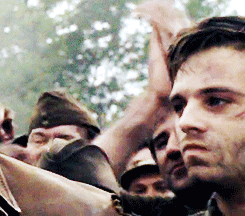
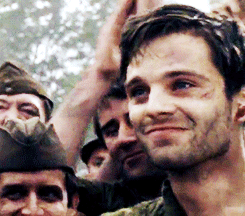
Source: https://cogentranting.tumblr.com/post/174225812218/comic-bucky-phdna-bluandorange-edgebug
There’s an additional scene in this film that, while played for laughs and parallels between Bucky and Steve, has always meant more to me. When the Howlies are all gathered in a bar, drinking, laughing, and having a good time, Bucky is by himself in the back room (avoiding friends) where it’s quiet (avoiding loud disturbances that could rock him) and he can keep an eye on his surroundings (being overly alert). His uniform is disheveled and he’s lost that cocky Sergeant Barnes signature look. When Peggy walks in and completely ignores him, this is Bucky’s reaction:
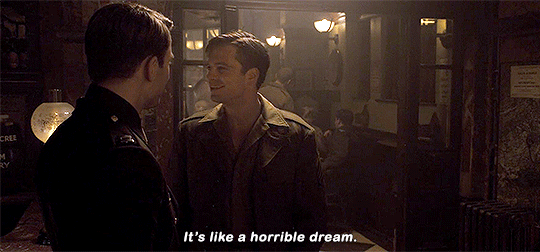
Source: https://steviebarnes.tumblr.com/post/181821865007/steve-little-shit-rogers
I don’t think Bucky was exaggerating here. Everything he’s been through lately is a horrible dream. We don’t talk about this scene enough in terms of how it shows Bucky’s vulnerability; it’s really the first hint we have that Bucky has lost a part of himself during this war.
Engaging in Dangerous Behavior/Overworking
In Captain America: The First Avenger, we witness Bucky deploying a negative coping strategy for the first time: over dedication to his work that suggests he’s overcompensating as a way of avoiding thinking about his trauma. Engaging in reckless or dangerous behavior also is a symptom of PTSD. Bucky continuously experiences new stressful situations, which ultimately will extend his healing time. For example, he willingly goes on a mission to capture Zola, the man who strapped him to a lab table and pumped him full of knock-off super soldier serum. Seeing the doctor again would be enough to trigger Bucky into an episode but he goes anyways because his dedication to the mission is more important to him than his mental stability.
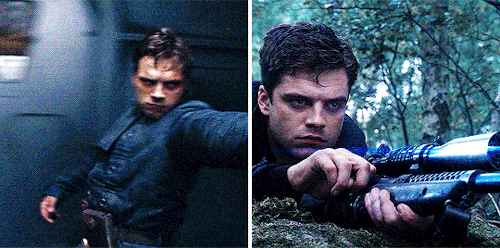
Source: https://n-barnes.tumblr.com/post/170542194046/bucky-with-the-guns
Now, this is still an active war zone. The necessity of the Howling Commando missions to win the war means that Bucky doesn’t really have time to process what’s happened to him; he’s incapable of coping in a healthy way at this point and charging forward, continuing to work, is the only way he knows how to survive.
Bucky has a bad habit of not avoiding his triggers when he feels the mission is more important than his mental health. A common theme throughout every film is that Bucky is put into one dangerous situation right after another, usually immediately following a five minute breather.
In Captain America: The Winter Soldier, we see glimpses of Bucky Winter being pulled in and out of cryofreeze, placed on mission after mission. The one time we begin to see that there’s more to Winter than they’d have us believe is when Bucky’s memories surface for a hot minute in the bank vault. He has about 30 seconds of downtime where he’s aware and then…wipe him. Back on the mission to kill Captain America. Everything about his time as the Winter Soldier was dangerous; it’s not like Hydra really cared about his physical or mental health. All those years of trauma and overworking probably crashed down on Bucky, hard, the moment he was in control of his own mind again and able to rest. And his brain was in physical shambles on top of it. Poor Bucky.
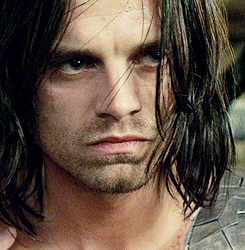
Source: https://mishasteaparty.tumblr.com/post/93678343244/prep-him
Similarly, in Captain America: Civil War, we get this amazing scene:
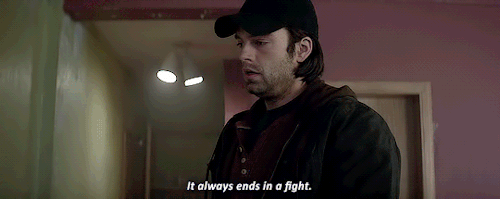
Source: https://mackievanstan.tumblr.com/post/176453875698/let-him-rest
And another in Avengers: Infinity War:
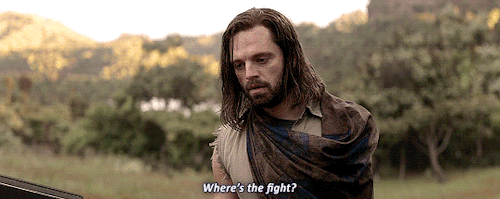
Source: https://mackievanstan.tumblr.com/post/176453875698/let-him-rest
Once again, Bucky keeps getting thrown back into the middle of a fight when he needs to be resting. This is a very, very bad idea. Super bad. Could really fuck with Bucky’s mental health permanently, bad. This is pretty much the definition of overworking to a detrimental degree.
But what I really love about his reactions in both of these scenes is that he knows exactly how poor of an idea it is. He knows continuing to fight isn’t good for him and he’s exhausted. He goes willingly anyways, but he has this amazing control over himself at this point. Every single fight could have Bucky experiencing an episode and losing himself to the trauma; he doesn’t. (To be fair, I think this is what the Russos were hinting at but they could have worded it so much better). Bucky could have walked away. He could have surrendered in Bucharest, he could have hidden in Wakanda. He fought anyways.
This shows just how complex Bucky’s PTSD really is and how well he’s coping with it: he’s engaging in dangerous behaviors which could trigger him, but he’s doing so with awareness and self-actualization. He’s got a handle on himself. These coping behaviors directly contradict the Russos’ statement that you “don’t want to give another weapon to that guy, it could end up being used the wrong way.” With the exception of being literally triggered with the Winter Soldier code words (which are no longer a threat because good job, Shuri), Bucky fights the good fight every single time. He doesn’t go rogue. He doesn’t lose himself.
Yeah, if that doesn’t make him a hero, I don’t know what further proof I can provide, because he does this in literally every single film.
Active Coping
Active coping means accepting the impact of trauma on your life, taking direct action to improve things, and creating habits that help you respond to everyday life in a positive manner. Avoiding triggers - people, places, anniversaries, or other reminders of the traumatic event - can be a healthy coping strategy.
The first time we see Bucky take a step toward positive active coping is in Captain America: The Winter Soldier:
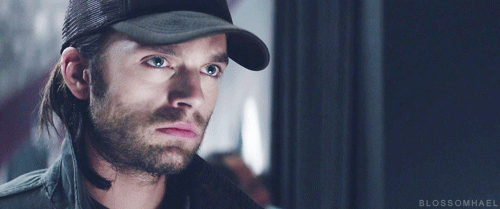
Source: https://thatpleasantnightmare.tumblr.com/post/147118407198
Bucky just escaped being a prisoner, was injured in a gruesome fight with his best friend, and is now on the run. What’s one of the first things he does? Research. More than that, in this scene, Bucky is clean, in civilian clothing of his choosing, and appears to have treated his injuries from the fight on the carriers. His eyes are clear and although he is in a public (read: dangerous) setting, he’s aware of his surroundings, has a calm grip on reality, and is processing information. This is Bucky taking the first step to actively reclaiming his identity. This is when we see him begin to heal and he’s doing it on his own. He’s on step one of learning to actively cope: accepting the impact of the trauma on your life.
Bucky continues to exhibit positive coping strategies on his own as time moves forward, as we see in Captain America: Civil War. By the time we meet up with Bucky in Romania, he’s already taken direct action to improve his situation. When we first see Bucky, he’s at a local market, smiling and engaging in conversation with a vendor while he buys produce. He looks good; is physically fit, is practicing hygiene, and is in clean clothes that protect his identity.
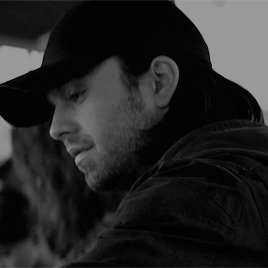
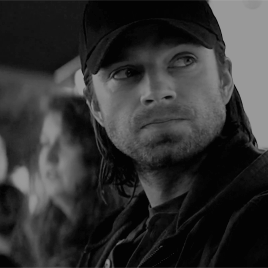
Source: https://buckybgrnes.tumblr.com/post/174829011372
I love this scene and specifically the way Sebastian played it, because we see Bucky exhibit positive and negative coping strategies nearly back to back. As he’s trying for normal, he’s also hyper aware of his surroundings, unwilling to let his guard down. He’s scanning for anything that could trigger him or endanger his health, but he is aware. Staying alert and on guard is a classic symptom of PTSD.

Source: https://kittyseb.tumblr.com/post/144559460240/this-whole-scene-of-bucky-on-the-streets-of
However, we have to understand that Bucky’s situation requires this sort of hyper vigilance. He’s a wanted man, both by Hydra and the CIA, and he’s actively being hunted. So although Bucky is displaying a classic symptom of PTSD, what we see here is him deploying a positive strategy for coping. By staying aware to his surroundings, he’s protecting himself. This is opposite to the kind of harmful behavior we should expect from him at this point in his recovery. He’s by himself, without any support, and has to look over his shoulder every block to make sure that he’s safe. Extreme hyper vigilance would show being Bucky afraid to leave his apartment altogether. Again, while he is suffering and displaying symptoms of active post traumatic stress, he’s also actively coping by taking direct action to improve his circumstances and creating habits that improve his daily life.
Through the entirety of the Romania scene in Captain America: Civil War, we catch glimpses of other healthy habits and positive coping strategies Bucky has developed.
Practicing Mindfulness
One really great blink-and-you-miss-it detail from the film is the existence of Bucky’s journals. As Steve goes through Bucky’s stuff (really, Steve?), you see him pick up a journal from the top of Bucky’s fridge. Inside are notes, memories, and references, categorized and marked by tabs. This is one of my favorite examples of Bucky using another strategy for coping with PTSD: mindfulness.

Source: a shitty screenshot I took from the movie.
Mindfulness: a mental state achieved by focusing one's awareness on the present moment, while calmly acknowledging and accepting one's feelings, thoughts, and bodily sensations, used as a therapeutic technique. Mindfulness may help people get back in touch with the present moment, as well as reduce the extent with which they feel controlled by unpleasant thoughts and memories.
This is an extremely positive practice for Bucky, because at this point in the films, he’s still suffering from brain damage and memory loss. We see several examples of Bucky shaking his head, blinking, and losing himself to possible memories throughout the films. Journaling, as a way to capture those memories, categorize them, and begin rebuilding a timeline of his life, can help Bucky identify his triggers, work through episodes, and ultimately distinguish between past memories and the present, enabling him to regain control of his mind.
Maintaining a Healthy Lifestyle
When Bucky appears on screen, we see that he’s physically fit and obviously taking care of himself. We can assume that during his time as the Winter Soldier, Hydra kept Bucky in peak physical condition in order to succeed in every mission. Whether that was through training, supplements, drugs, the super soldier serum, etc., we don’t know. We don’t see Bucky continuing this training, but we do see the results of it. He’s capable of fighting, obviously maintaining his strength, and he’s able to run away.
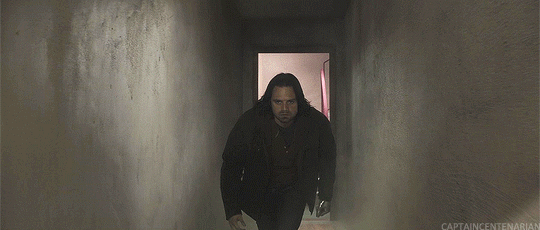
Source: https://captaincentenarian.tumblr.com/post/149852437382/bucky-running-majestic-hair-appreciation
We also witness Bucky making healthy choices in terms of food. He’s got energy/protein bars in his apartment, snacks readily available, pots and pans which would imply he has been cooking, and even a thermos to keep himself hydrated. He’s doing his best to maintain his physical health, which in and of itself is a very positive coping method. He could be depressed, lost in his own mind, never getting out of bed. But Bucky wants to survive, he wants to be better, and so he takes care of himself. This is a good thing.
If you haven’t seen it, please read this post about Bucky’s apartment, because it hits on so many great points about how Bucky is taking care of himself.
Recognizing and Avoiding Triggers
Now for as many positive steps Bucky has taken to actively cope with having PTSD, he’s got awful luck when it comes to avoiding his triggers. It’s two steps forward, one step back, every time.
At the beginning of Captain America: Civil War, Bucky is trying his damndest to avoid being caught. But stupid Zemo has other plans.
Look, it’s hard for me to describe what happens next in the film. The way that Sebastian played these scenes will never not give me chills. We get an up close and personal view of Bucky’s PTSD in ways we’ve only caught glimpses of up until now; I don’t know what Sebastian researched in order to create this performance, but it is so spot on that it’s difficult to watch. I wish he got more credit for his acting and it’s a damn waste that he only had 30 seconds of screen time in subsequent movies. *sigh*
Anyways...
We see the acceptance and the fear in Bucky’s eyes as the CIA takes him into custody. He’s maintaining his composure, more than he should be capable of doing at this point, and he’s also letting himself slip into a safe zone (“I don’t want to talk about it.”). Until Zemo begins reading the trigger words.
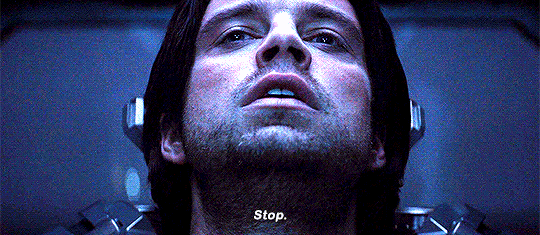
Source: https://cvssian.tumblr.com/
Good grief, y’all. Look at him struggling. Bucky literally tried to fight his way out of being triggered, but he failed. Every fear he’s had for the past several years is happening. He’s losing control of his mind, of everything he’s worked so hard for up to this point. I don’t want to look too far into this as a commentary on Bucky’s character, because I don’t think the writers meant for it to be the deep - it serves more as a plot point to get us to the war part of Civil War - but if you stop and examine it for just a second, this scene is an absolute outrage. I can’t believe this happened to Bucky’s mind. They turned him into a weapon, again. They stripped him of years of hard work and recovery.

Source: https://brolinjosh.tumblr.com/
Thankfully - thankfully - one quick hit to the head later, and Bucky’s back. Not only is he aware of his surroundings, he’s cognizant enough to try playing dumb to Sam and Steve at first. I like the conversation that takes place between Bucky and Steve here, because Bucky was smart enough to give Steve exactly what he needed to hear to prove that Bucky was no longer a threat. We don’t talk about Bucky’s raw intelligence enough, likely because we’re always talking about his grief, and this scene gives us one of the rare moments in the film where we get to witness Bucky strategizing. He was just triggered, his brain is mush, he just lost control of himself, and then immediately after, he’s back on mission. We’re back to avoidance/no time to process. Bucky tucks being triggered as Winter into his back pocket to be dealt with on another day.
Remember how I said Bucky keeps getting thrown into fights, one after another? Guess what.
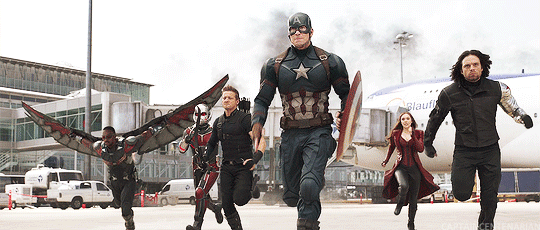
Source: https://captaincentenarian.tumblr.com/post/149852437382/bucky-running-majestic-hair-appreciation
There are a lot of significant, interesting parallels happening between Captain America: The First Avenger and Captain America: Civil War. The plot goes like this: Bucky was captured and actively tortured; Steve rescued him; they have no time to discuss what’s just happened and deal with it; and then Bucky is forced into another fight before he’s ready.
We can draw a lot of comparisons between the Howlies and Team Cap here and I wish that they had made the effort to explore this more in the film. This is the first time Bucky and Steve are fighting on the same team again since the war. Bucky is following Steve’s lead, even though he doesn’t know the people he’s fighting with/against, and he’s doing it because it’s for the greater good. They have to stop the other winter soldiers; the mission always comes first.
The biggest difference between the two films - and Bucky’s current state of mind - is that in The First Avenger, Bucky was actively avoiding recognizing his trauma after very similar events occurred, and in Civil War, not only does Bucky acknowledge what happened to him, we get this very poignant scene that’s both beautiful and devastating:
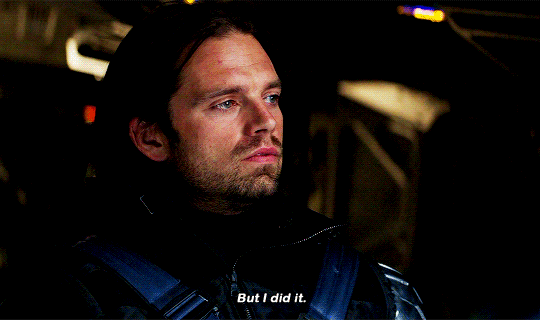
Source: https://bifelicitys.tumblr.com/post/182734674220/what-you-did-all-those-years-it-wasnt-you-you
This is a healthy outlook of acceptance and Bucky arrived there with nearly no outside assistance up to this point. This man has been through hell and back in the past 24 hours, on top of a hundred years of tragedy, and instead of breaking down as any reasonable person would, he fights. He has a long way to go in his recovery, but look how far he’s gotten on his own. And this is before Shuri’s help. Bucky’s willpower, tenacity, and depth of character never ceases to amaze me.
This is especially true with what happens next. You know how I said Bucky has awful luck in avoiding his triggers? Well...does walking back into the base of your own free volition where you were held prisoner and tortured for decades, count as maybe, oh I dunno, an event that should be avoided at all costs?
I’m being sarcastic but the depth of this moment shouldn’t be overlooked. Bucky going back to Siberia after everything he’s been through is a huge step backwards for his recovery. Siberia is crawling with triggers, from the threat of the other soldiers, to the cryo chambers, to the chair that wiped his memories and turned him into the Winter Soldier. The amount of bravery it took for Bucky Barnes to walk back into this place can’t be measured. He’s looking his history dead in the eyes with a shaky finger on a trigger and the fact that he doesn’t crack is astounding.
But then...this happens.
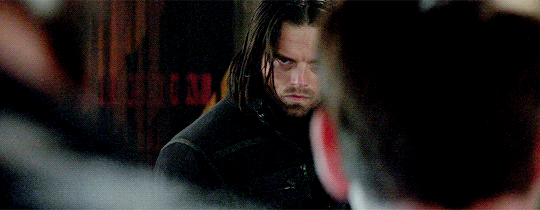
Source: https://tonystark.co/post/165333715841/buckys-facial-expressions-as-tonys-watches-the
I can barely stand to watch this because we are seeing Bucky actively having a PTSD episode. As the tape plays, Bucky is dissociating; he’s not there in the room with Steve and Tony, he’s back on the country road where he killed the Starks. The fear and the tears in his eyes, the recognition of what’s playing on the tape, and the knowledge of what’s about to happen are too much. His reaction here shows that he’s barely in control. He immediately responds to Tony lunging at him by raising his gun, an instinctive response, only to lower his weapon seconds later because of the acceptance of what he’s done. This is brutal and heartbreaking and very real.
It gets worse.
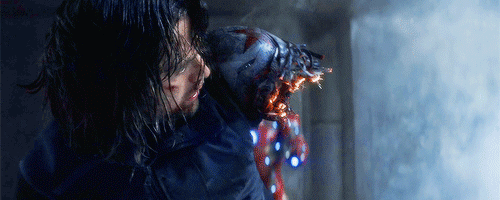
Source: https://itsawkwardfanboi.tumblr.com/post/176703555531/breaks-my-heart-seeing-him-about-to-pass-out
Bucky snapped in desperation and we witness him lose control in his battle with PTSD. It is very common for fight or flight to kick in under extreme circumstances and pressure; Bucky tried to escape, to avoid this outcome, but he couldn’t. The only thing he had left was to fight. We see Bucky lose control, not as Tony is threatening him, but because Steve is threatened. Bucky was fighting Tony, not to harm him, but to stop him, and not to protect himself, but to protect Steve. It’s an entirely different fighting style than Winter; it’s meant to disarm, not to destroy. Even though Bucky just experienced multiple triggers and traumatic events in a short timeframe, even though he is smack dab right in the middle of a traumatic episode, he still only wants to stop the fight, not kill. This is another example of how the Russos’ comments were unfair and incorrect. Bucky doesn’t go on murderous rampages; he tries to do what’s right. And what happens to him because of it?
He loses. Every single time.
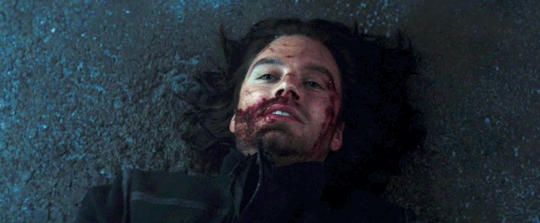
Source: https://marvelworlduniverse.tumblr.com/post/172306346232
I will never forgive the writers for making Bucky lose his arm twice. Bucky has a real disability and it has always bothered me that his arm is only ever discussed as a weapon. The trauma from losing his arm the first time was never properly dealt with and here we are again, recycling that awful, painful, horrible plot point. There comes a certain point where you’ve hurt the characters enough and it does nothing for their character development. The grief, pain, and acceptance we see in Bucky’s eyes as he’s lying there wrecks me. He didn’t need to experience this. He’s been through enough. I don’t know how he’s still physically alive or not mentally lost without hope of recovery. But he is. He gets back up. And you know what he does next?
He asks for help.
Asking for Support
An important part of recovery is having a team of people around you to support you when times are tough. It is amazing to me that Bucky got as far as he did in his recovery, finding positive coping strategies and habits on his own while on the run.

Source: https://juliastiles.tumblr.com/post/178049225734/captain-america-civil-war-2016-dir-anthony
The acknowledgement of Bucky’s trauma in this scene was poignant and bittersweet and I’m very glad they included it, although I feel Steve here. It was sad to see Bucky go back into cryo, but it was necessary until the triggers could be safely removed.
And they were. This is my biggest issue with what the Russos said - they seemed to have either forgotten or refused to acknowledge what happened in Black Panther, when Shuri successfully removed the triggers and healed Bucky’s brain damage (cough, I know which one I’m placing my bets on, cough). We don’t disrespect Shuri like that in this house.
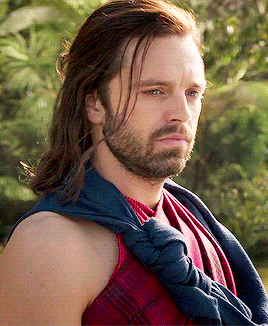
Source: http://stevechoosesbucky.tumblr.com/post/173521604559
From this point forward, Bucky’s brain is no longer damaged. He is no longer experiencing memory loss, nor is he capable of being triggered into Winter Soldier mode. Yes, he still has PTSD. Yes, he will need to continue to work on his recovery, just like Steve, just like Sam. And he does.
Speaking of Sam, this tidbit from Avengers: Endgame is really satisfying.

Source: https://paper-storm.tumblr.com/post/184537376766/can-we-talk-for-a-second-about-how-bucky-was-a
This moment is important because it shows that 1) Bucky is still very vulnerable and dealing with a lot of grief; the last time he saw Tony wasn’t exactly on the best of terms and now Bucky can never make up for what he did, and 2) Sam is an invaluable person to have at your side and a very, very good friend.
It’s hard to tell where we will go from here in the series/the next round of films, but I have a suggestion for a direction: get Bucky back to his positive coping strategies. Such as...
Spending Time Outdoors/With Animals
Before the battle in Avengers: Infinity War, we catch up with Bucky doing something seemingly very out of character: farming. Look, my blog name is Bucky the Farmer, it should tell you all you need to know about how much this tickled me when I first saw it. But upon further reflection, I realized how important this activity actually is.
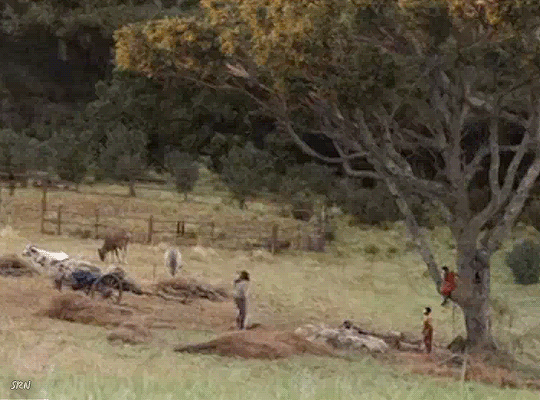
Source: https://steverogersnotebook.tumblr.com/post/179505503935/bucky-in-wakanda-initial-recovery-vs-settled
It’s been shown that spending time in nature and around animals can have positive soothing effects on people who are recovering from trauma. Have you ever gone on a nice walk after a bad day to calm your mind, or spent a few minutes petting a dog? Do you exercise as a form of stress relief? It’s the same thing.
But what we’re also seeing here is Bucky taking responsibility for living beings beyond himself. He’s also interacting with children, an innocent and safe way to re-socialize himself. At this point, Bucky is past the stages of recovery where he needs to avoid, acknowledge, or actively cope with his trauma. He’s healing. He’s moving forward and learning how to live again, not just surviving day by day.
What happens next?
Prior to The Snapture, Bucky’s life was in Wakanda. Avengers: Endgame left quite a few stones unturned when it comes to Bucky’s future; we know that he’s in New York, that he won’t carry the shield, and seemingly, he and Sam are friends. He might hang out with Old Steve every now and again, visit his home in Brooklyn, or get a few goats. Maybe he’ll go back to Wakanda. Maybe he’ll be a part of the Avengers. We don’t know what Bucky will do next.
Regardless as to what happens, Bucky is in a good place. He’s experienced loads of trauma, but the physical and mental effects have been treated. His brain is not damaged and he’s continuing to recover. And when he’s ready, which I believe will be sooner than we think, he’s going to kick utter ass.
Bucky is still one of the most badass characters to ever be created; he’s efficiently deadly, a skilled fighter, the world’s best assassin. Those skills haven’t disappeared because he’s now in control of himself (and, some of those skills he had before he was the Winter Soldier; they were what made him a prime candidate in the first place. Remember, the Winter Soldier was supposed to be an equal foe to Captain America).
But he’s also so much more. Bucky has chosen to be morally good. A man who knows he can be the deadliest person in the room but chooses not to be is powerful. Is this not a direct callback to Erskine’s conversation with Steve in The First Avenger? Remember, Captain America is not a perfect soldier. He is a good man.
Bucky Barnes is a good man, no matter what trauma he’s experienced. So is Sam Wilson.
I absolutely believe it was the right choice for Sam to take up the shield at this moment in time. Let’s just get that out of the way, no Sam hate here. But I have a problem with the idea that Bucky couldn’t take up the shield because “he’s damaged” and that’s why it went to Sam instead. The Russos’ statements were insulting to both characters. Sam didn’t get the shield because Bucky wasn’t ready to carry it; Sam got the shield because it was right and he earned it. Sam deserves to be Cap just as much as Bucky deserves to take a damn nap. They don’t need to knock Bucky down in order to lift Sam up. It was a deliberate choice of words and it was wrong.
On some level, I understand what the writers and directors were trying to say: Bucky simply isn’t ready. And yet, they continue to speak about Bucky as if he’s weak, a villain, and permanently broken; I don’t think they can truly grasp how much of a complex and compelling character he really is. They had years to prepare a wise, thoughtful answer to the question of Bucky’s future and instead, they spouted off some ableist bullshit. They could take this character that embodies so much of what’s good and evil, right and wrong, fearful and hopeful, and use him to speak to hundreds if not thousands of individuals about the importance of never giving up and letting yourself find peace. They do this perfectly with Steve (“I can do this all day”) and Sam (“Are you going to carry it in a big suitcase or little man-purse?”) but why not with Bucky?
We just don’t know. But Bucky Barnes surely deserves better.
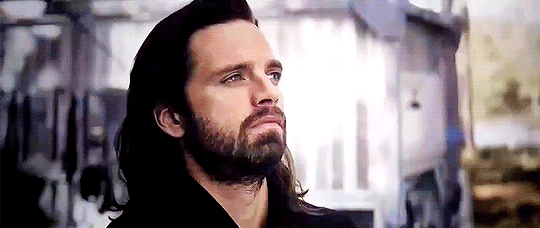
Source: https://captain-flint.tumblr.com/post/184564356218/bucky-barnes-in-avengers-endgame-looking-like-a
Recovering from trauma is an ongoing, nonlinear process. All Marvel characters have gone through some form of traumatic events and recovery. Bucky has experienced more than his fair share, but he will always survive, because that’s what he does. Now, he has the opportunity to thrive, if only the writers and directors will let him.
Sources:
https://www.mayoclinic.org/diseases-conditions/post-traumatic-stress-disorder/symptoms-causes/syc-20355967
https://www.ptsd.va.gov/understand/what/index.asp
https://www.ptsd.va.gov/gethelp/selfhelp_coping.asp
https://www.helpguide.org/articles/ptsd-trauma/ptsd-symptoms-self-help-treatment.htm/
#bucky barnes deserves better#bucky barnes#avengers: endgame#endgame#russo brothers#tw: ptsd#the unknown future of james buchanan barnes
407 notes
·
View notes
Text
The Quirks and Qualms of Online Class

The global pandemic terrorizing us as of the moment has taken so much of our lives when limited social contact was introduced. Preventing the virus from spreading further has reduced our lives to crumbs, robbing a lot of us of the chance to create a better life for ourselves in the outside world, forcing us to powerlessly retreat within the walls of our homes. And sadly, to say the very least, even the education system wasn’t safe from the Corona effect.
Remote learning seems to be the next logical step that most academic institutions can come up with because of the whole social distancing thing. For a while, it was a step so many dreaded to take because of how evident it was that it was just a disaster begging to take place — the countless government officials continuously campaigning to push through with the academic year weren’t of good help either — although it eventually arrived to a point where it was the only thing they could think of. Some have already opted to use this means of providing as early as April to finish off the previous school year, or summer semesters in some university constituents, all in little steps, but in general, we all know how it is: this type of learning is new to most of us, especially for those of us who are used to face to face learning, and we’re all learning to adjust to it while we’re still contained indoors.
The university I attend already had us undergo the whole process of online learning during our Midyear semester last June, where we took a couple of subjects that we were supposed to enroll in for the summer had the world not gone batshit crazy, opting only to open the possibility of attending that midyear semester for those who are required to do so in their respective course program curricula. We held synchronous online sessions via Zoom, where meetings were recorded for everyone's access, making for more accessible resources for note-taking, and used the online learning platform Canvas as pilot testers (both accounts provided by the university itself along with our emails) that we utilized for transfer of information, like learning materials and paperless, digital submissions, generally, and it all seemed to work, for a term that lasted a month maximum. But even before it began, I had a lot of qualms and reservations, particularly on how it’s all going to play out, and how it’s going to affect my performance and my academic standing, because up to that point, I’ve never taken any class or required academic sessions within virtual online learning platforms (not that I was happy while I was taking it, anyway; it’s a hellhole waiting to burst like a pimple). And that was just for a Midyear semester, which was four weeks at most; given how they’re planning to have this coming regularly-paced semester (shortened for the purpose of everyone’s convenience, although I’m pretty sure that’s going to do more harm than benefit, especially for students) purely on remote learning accords, we have no idea how we’re all going to take it on, not with major subjects and a lot of skill-based outputs being asked of us, which are probably much, much heavier than the countless submissions we had to do previously.
But you know what the boomers think: it’s all better than letting the school year just fly away, they didn’t have access to privileges like this so we’d better put up with it. Go now, plan later; and to that, I say one thing — you can’t stop a runaway train.
Even though one month of putting up with this mess is probably just a rough estimate of just how grueling an entire semester online is going to be, I would like to share a few of the things that I’ve noticed about remote learning that are not so great, and, to be completely unbiased, fine by my own judgment. I’m going to use the experiences me and my fellow Biology majors had whilst taking them to truly evaluate how effective it is for university students here in the Philippines, all with the company of you, my dear readers. This is, however, limited to the things we’ve experienced, and may vary for different situations, like from the point of view of a faculty member or a student of a different school, so please, take all of this with a grain of salt. We have no idea if things are going to play out exactly like they did previously, but it’s good to know a few things to prepare ourselves, right? Consider this as sort of a primer — from one lousy college student to another. If we’re going to deal with this bullshit, we’re going to look at it together.
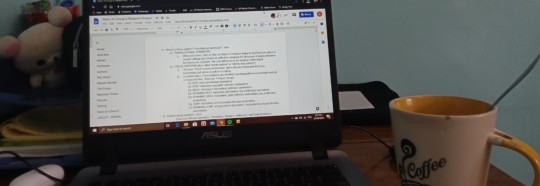
For starters, remote learning is kind of energy efficient — and when I say that, I don’t mean chill. God, no; it’s anything but. The main thing I really like about learning from home is that it saves us a lot more time and physical energy than how much we usually need to attend face to face classes. It’s a very striking point, and I’m sure some may see it beneficial, especially those who still need to put up with the commute to go on campus. We don’t have to worry more about budgeting our time between classes and activities outside, like what time we’d have to wake up so we can have more time to get ready for our day ahead, or where to eat and what to wear to go out. We can wear home clothes while attending classes (not like your clothes even matter, anyway; at least not in UP) and don’t have to deal with the headaches and heartburns you get when you try commuting in the Metro, since we’re all just indoors. And let’s not forget, for someone who attends a university situated in the middle of a bustling city with people of all shapes and sizes that you can never trust, being confined to our homes means we are in a much safer environment, where we wouldn’t have to worry about being robbed every fifteen seconds or won’t have to look twice so every passing vehicle gets a lesser chance of ejecting us off the street. We’re all sitting within the walls of our homes, so we have lesser things to worry about logistically, so to speak. Besides, stepping outside is even more of a risk now than ever, and making available materials to access at home may reduce the probability of that risk getting the best of us, so at least that’s out of the way, like it’s supposed to be.
One thing that also struck me about remote learning is how it’s heavily dependent on how you pace your studies and work. Since your learning environment consists mostly of you and the digital materials, apart from the synchronous classes some professors require, a lot of the time, the way you’re going to deal with this is mainly on how you decide to work on it and how your pace with regards to taking everything on would be, and since there are scheduled deadlines and exams, and you can’t afford to lose any of your precious time monkeying around, albeit the hard way, you’ll definitely learn to manage your time on your own. It’s not completely individual, as there were still group tasks and outputs to be submitted as a unit, but since you’re all alone in your workspace, it’ll all depend on how well you manage to properly do these requirements. Time management is a key factor in college, or in any school level setting really, a skill better than any studying technique you will ever come across, since it helps a student tackle the countless loads of work being tossed their way without it stacking up to immediate doom, and remote learning prompts one to find the method that allows one to work with the flow the easiest — kind of like the perfect key to crank up an engine.
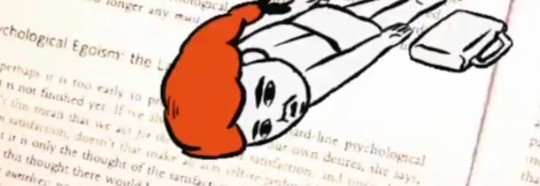
But the thing about remote learning is, for a whole student system not entirely prepared and properly equipped for it, the cons outweigh the pros — by about a mile.
To put it simply, limited contact is much more stressful in the parts of those who are actually involved in the setup, which are, primarily, the student and the teacher. Home environments, right up the first bullet, are not all conducive learning environments. This is entirely dependent on various factors, which may range from more personal ones, like unfavorable familial setups or various distractions at home, or more logistical ones, like the location of the home itself, all contributing to numbers and numbers of disruptive tendencies, none of which are under the child’s control, which may result to their lack of focus or increased anxiety. Home environments are not made for learning, unlike schools and universities where students are free to study without any distractions, and this may hold back the smooth process of their learning if continuous and entirely destructive — and there’s nothing the students nor the instructors can do about it but stress out. The number one most notorious culprit of them all, undeniably, would be the alarmingly appalling mediocrity of the Internet connection the majority has access to, which, on particularly bad days, may result to unfavorable situations almost unexpectedly, like constantly being cut off from the session and unclear instructions from professors, mostly, who have unfavorable access to the Internet themselves. The constant unannounced power cutoffs in some parts of the country (which is, personally, my biggest qualm and pet peeve that I have developed during quarantine) would come in at a close second, especially since a lot of these blackouts have no given range, much to the dismay of the consumers. On top of these are some unexpected inconveniences, like glitchy learning environments and faulty instructor-to-student communication, brought by lack of time synchronization, mostly, that may not seem like much, but can make this whole experience a whole lot shittier than it actually is.
And what’s even more stressful is the few solutions to these problems can all but do so much; mobile data as a substitute for WiFi connections can only give us so much with promos and the money it costs, but in the end, it’s still no match for the data requirements synchronous meeting platforms like Zoom or Google Meet require, so it’s best to just skip the class than waste your time and data trying to reconnect. Instructor-prepared course packs, which contain all materials needed for the subject, definitely designed to cater to students who lack the resources to make it to online classes, may work, but there’s still a lot of considerations that need to be made for their evaluations, which, preferably, need to match with the rest of the class they’re in. I know — no one wins here, except probably only the officials of our crappy Internet providers, happy that they still have a lot of people to leech out of.
The curriculum of the various degree programs students are enrolled in are at stake, because so much adjustments need to be done in order for them to be suitable for the online setting that they all, well, don’t feel like genuine learning methods anymore. Skill-based programs, like mine in Biology, for example, are particularly affected by these changes, since the materials and the opportunities for us to learn the skills we need for our degree are out there: at the labs, at the campus, out at the world. The pertinence of the development of methods to teach these practical courses with limited contact cannot be denied, but actually fulfilling those requirements physically and learning them with your own experience is something with much more impact, and that can’t be denied, too. The limits imposed on learning these necessarily skills will also limit the students to what they’re being given; if they’re given half the materials to make a bun of bread, they’ll only come up with half of that bun, because they’re given so limited resources. We don’t even know how lab classes will take place — how are we supposed to be sure we’re going to learn from them? Not only that, but the curriculum coming to play is at stake, too; take synchronous evaluation procedures, for instance. Does anyone want to take a quiz or an exam with relentlessly flopping Internet, with electrical power that plays Russian Roulette every single day of the year? Of course not, because you want to do as well as you possibly can in this exam. Do you want to wake up to a blaring, incomplete grade because the assignment file you’ve busted your ass for just didn’t make it through the portal, although you swore to your underwear drawer that you did? Of course not, and that’s why checking the submission box three times is almost nothing. So much of the learning process is being compromised and limited by a lot of factors outside of our control, it’s almost impossible to bounce back into the much-favored learning headspace we all desire to be in. We’re spending so much time worrying about not being able to learn because of so many things around us glitching that we lose, albeit gradually, our focus on actually learning.
These factors all narrow down to one big boulder about to trample one smacking detail within us: our mental health. It’s already bad enough that we’re dealing with the health crisis erupting everywhere around us, a health crisis that doesn’t seem to want to tone down anytime soon, and hearing and seeing so much of the tragedy it’s bringing to our country continuously, but we have to also constantly worry about whether or not we’re learning the right things or submitting the right things on time and still making sure we’re doing our best despite all of it. Imagine the constant anxiety and the rigid schedule of a regular semester multiplied thrice, all dumped online — with a few adjustments here and a few tweaks there, but almost inaccessible to some, and too much for many. You're not even sure, at any given point within the months-long span of supposed learning, if you're doing it to actually absorb the knowledge, or just fulfilling it because it's a requirement, and just hurriedly making sure everything is taken care of because you don't have any more energy to drag it on longer. That’s how mentally draining it is. And I get that I might be exaggerating (I have an underlying tendency to do so; forgive me, my bad) but who’s to say that it may not ring true for some? If you’re anything like me, who finds comfort in the company of peers, in the little things like building a routine and sticking to it, distracting yourself with new, uncharted things every day, and managing your stress outside the confinements of a house, then it’s probably taking a huge toll on you, too.
But all that’s nothing compared to those directly affected by the pandemic, like the family members of healthcare workers, those whose main modes of making a living were laid off due to contact protocols, and, most importantly, those who lost so many people dear to them because of a virus no one can contain. I can’t explain how much my heart cracks in my chest when I see a student looking to social media to ask for a means to fund his schooling, or when a person I rarely know is knocking to ask for a few pesos to get their ailing family members through. Remote learning, online classes, really, would work just fine — if you belong above that margin. If you have access to resources without going scathed, have nothing else to do but focus on what’s important for you, and leave the rest of the world outside your door. The exclusivity of remote learning is striking, and it’s extremely absurd how much people want to push through with it despite so many consequences for so many unwilling benefactors — six million children, to be exact — left behind. Children should never have to beg, lose themselves, or destroy themselves to be able to learn, because it’s their right to be given a chance to be the best they can by pursuing this education to the fullest extent. Apparently many people disagree.

Let me call remote learning for what it really is — a temporary aid, unsustainable way of dragging the students to uncharted waters. It’s a band-aid solution, meant to temporarily do what needs to be done while the future is still unknown. So many calls to stop the year from coming up have been put out there, as well as so much postponing and halting of the flow of inconcrete plans, promising to improve, but time and time again, to nothing; and amid so many calls for help, just within the education sector, there has been no reliable answer. Academic Freeze, which aims to halt the school year altogether, is not a plausible way of resolving this, as it is only student centered; although it may be beneficial for us, a lot of employees in the education system may lose their modes of income as well, which may lead to a shortcoming in their part. But given that, we also cannot turn our backs from the fact that so much of the student population, almost six million, will not be able to enroll, because education is a right that every child must be given, and if one child deserves to go on studying, they all deserve to. And postponing the opening of the academic year and delaying what is to come can only do so much.
Contain the pandemic — that’s the answer. If this administration, particularly the department concerned with this issue, truly cares about the rights of every Filipino to quality, equitable, culture-based and complete basic education, then they’ll take the necessary steps to put an end to this and protect not only those rights, but, to the administration itself, the welfare of their people.
Delaying the problem isn’t putting an end to it, because what’s only slowing down is going to gain momentum later on.
So many thoughts and so many words! What did you think about these experiences? And if your’re from the Philippines, what do you think about the Department of Education’s response to this rising concern? I’d love to hear your thoughts! Let me know by reaching me through the Inquiries page, or through my social media here I'd love to hear from anybody!
Like always, I wish everyone is doing well, being safe and secure, and in good health! I hope everyone is taking care of themselves by sanitizing and garnering a healthy lifestyle! It means a lot to me that you're here reading. Thanks for staying, and I’ll see you on the next one!
#online#classes#online classes#qualms#quirks#pros#cons#philippines#issue#education#children#university#hacking through life#hacking#through#life#off#the#beat#off the beat
1 note
·
View note
Text
The Keyblade Graveyard Part 2: Japanese and English Comparison

This is the sixth in a series of translation and analysis posts I’ve done about KH3. I’ll go into detail on camera angles and camera shots, draw connections to past KH games, and, of course, talk about translation and the social aspects of language.
I’ve broken up this analysis into multiple parts because it was getting so long. The first part covered Aqua and Ven’s interactions with Terranort, and this part is about when he attacks Kairi and Lea. There will be seven parts total.
Here’s a general key for the kind of analysis I like to do:
JP: Official Japanese Dialogue
EN: Official English Dialogue
TR: My Translation (usually more literal and thus more stilted than the official English version. I’m not using natural-sounding English in order to stick as close to the Japanese versions of the lines as possible for the purpose of analysis)
Notes: things I found interesting, grammatical points, extra thoughts, etc.
One last note: media doesn’t exist in a vacuum. Every work of art must be viewed through the cultural lens of the people who made it. Kingdom Hearts, for all its ties to Disney, is still very much a Japanese game, so it should be analyzed in light of that.
With that in mind, let’s continue.
We left off with Aqua screaming Ven’s name in a panic:
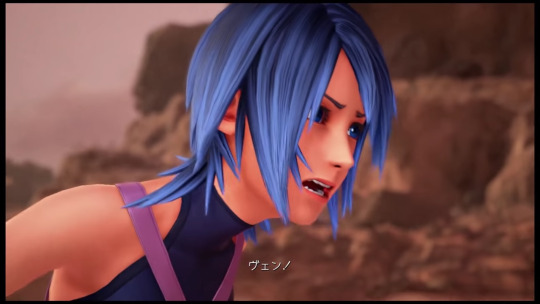
The next shot is at a tilted angle again to show how “off” everything is about what’s happening, and Sora is the one who attacks. Goes to show how protective Sora is of Ven, which is a nice character touch:

JP おまえ!
EN That’s it!
TR Why you!
Notes: Sora uses the derogatory second person pronoun omae here to refer to Terranort. His tone is forecful, too, to indicate he is not happy about what Terranort has done.
He summons his Keyblade and charges:
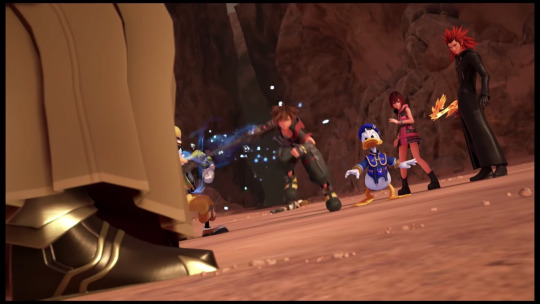
And the camera changes to Terranort’s perspective. This has the added effect of making it seem as if Sora is charging at us, the audience:
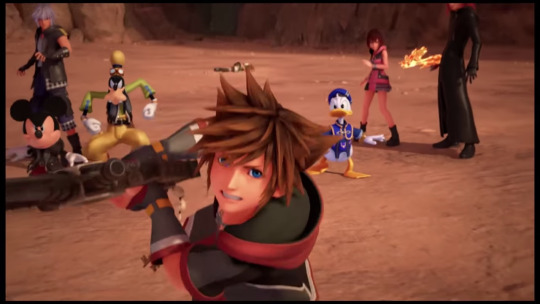
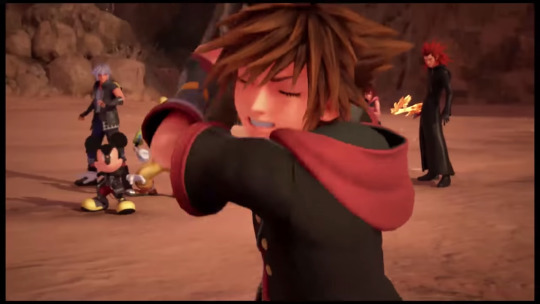

Only for Terranort to stop him with the power of darkness:

He grunts and struggles as he tries to free his Keyblade. Note his clenched teeth, too:

We get this bird’s eye view shot as Sora continues to struggle and Terranort holds him in place almost effortlessly. Note how he only needs to use one hand to do it, whereas Sora is using both hands to try to free his Keyblade:
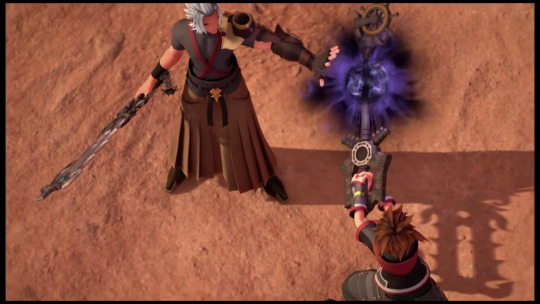
The camera pans over Terranort, and the Xehanort look is on full display in this shot before he blasts Sora backwards. Note again how the camera is at a tilted angle to add to the unease of the scene:

Much like when Ven was sent flying, the camera cuts to a rear perspective as Sora flies backwards. Note again the tilted angle and how the camera seems to be on the ground. Sora cries out both when Terra first blasts him with darkness…

…and again when he lands on his back on the ground. His Keyblade falls with a loud clank as well:

Note how his knee is bent here:

This will form a nice sense of continuity later on in the scene.
Terranort, content that Sora is out of the picture, turns around and sets his sights on Kairi, the camera panning with him:

The camera cuts to a shot from Kairi’s perspective of Terranort charging at her, and by extension, the audience. Note the tilted angle again:

Then we get a medium shot of Kairi bracing herself for the attack. Note her defensive stance as she gasps…

…only for Lea to jump in front of her in the nick of time:
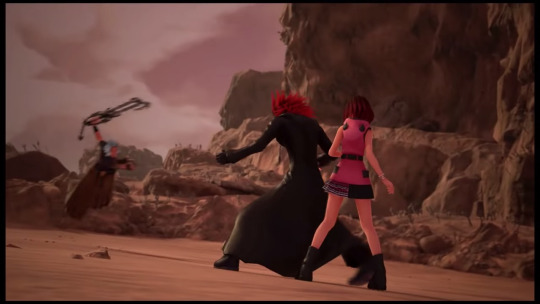
This is especially touching considering how he kidnapped her in KH2; it goes to show how much their relationship has changed since then. He was her kidnapper before, and now he is protecting her with his life. His redemption has come full circle.
The angle is tilted again, and the characters are viewed from behind in a wide shot to better show the action. Lea has his Keyblade out..

…but it’s not enough. Terranort is simply too strong. He throws Lea back like he weighs nothing, causing Lea to cry out…

…and the camera tracks Lea’s movement pretty steadily:

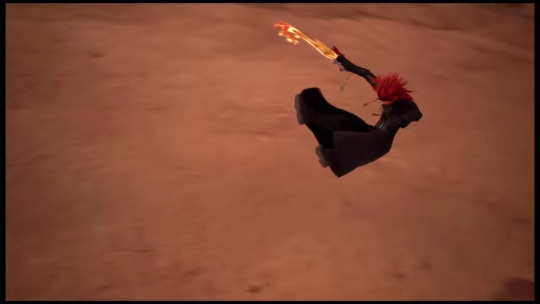

Lea hits a boulder (ouch!)…
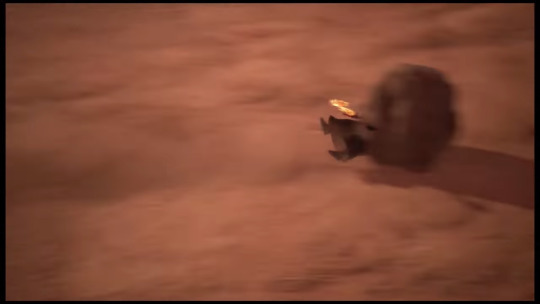
…before hitting another boulder, and the camera bounces and shakes as he does to give an idea of how hard he was knocked into those boulders, so much so that it affected the environment:

The camera cuts to a medium shot of Kairi, and much like how Ven’s loss was framed in terms of Aqua’s reaction earlier, the scene frames Lea’s loss in terms of Kairi’s concern, Kairi’s fear and sorrow and worry. She calls out his name, sounding very distressed:
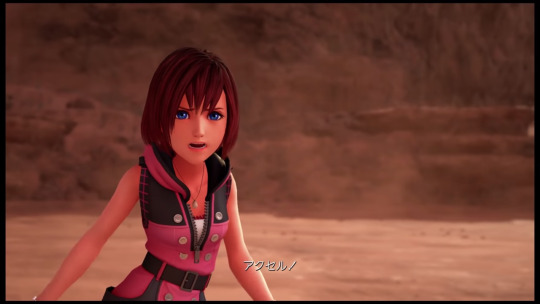
JP アクセル!
EN Axel!
TR Axel!
Notes: She uses the name Axel instead of Lea, just like he told her to. Another detail showing how close they’ve become.
Her concern is for his safety and wellbeing…

…until something, well, someone else demands her attention:

And her mouth drops open and she raises her in surprise:

We cut to a shot of Terranort with his Keyblade raised high over his head, and Kairi gasps as the camera tilts upward. Note the low angle that makes him look as if he is towering over her. The rapidity of the cut also suggests how quickly he moves:

Something else I noticed is that he is attacking her differently than he attacked both Ven and Lea before. Those attacks were sideswipes that caught them in the chest and sent them flying. This attack is meant to land on her skull and make her crumple to the ground. Terranort is certainly strong enough that such a blow could kill her on the spot.
And while I’ve seen people wonder why she didn’t use her Keyblade, in her defense, she just saw how useless both Sora and Lea’s Keyblades were against Terranort! She is a much less experienced fighter than they are; she knows that if they don’t stand a chance against him, she doesn’t, either. Plus, she’s still in shock from seeing Lea, her friend, her confidant, her fellow student, just get flung to the side like he was nothing. Her freezing up like this is understandable, especially considering how quickly Terranort moves.
Thankfully, Sora has recovered enough to sit up. Note how his left knee is still bent like it was when he was knocked down:

He sees what is happening…

…and moves to do something about it without hesitation:

Notice how the camera focuses on his entire body in a full shot to better underscore him springing into action.
His pose in the following screenshot is not unlike that of a runner getting ready to start a race. He’s preparing to push off the ground with both his hand and his right foot to give him as much momentum as possible:

He knows he has a limited window to reach Kairi, and timing is everything. He’s preparing to run as fast as he can as he pushes off:

The camera briefly goes into slow motion here as we see him running towards Terranort and Kairi with his arm outstretched:
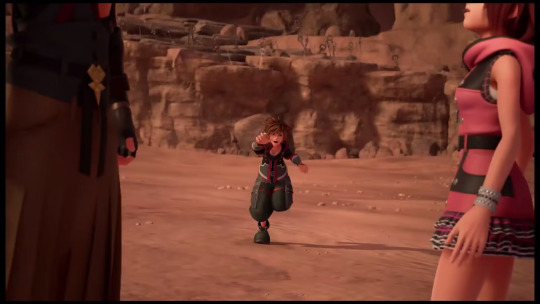
The framing in this shot is really interesting, too; we get a full body shot of Sora running towards the camera, with Terranort on the left side and Kairi on the right side looking up at him to really highlight the size/strength differences between the two of them:
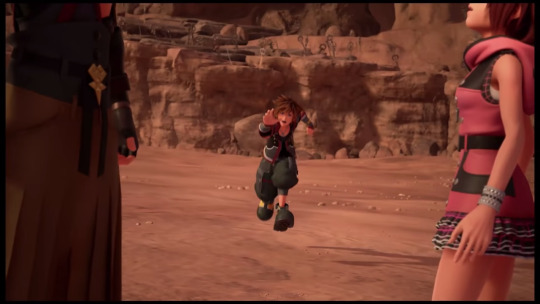
Note the camera angle is still tilted slightly to give that sense of unease:

Then the camera changes to a full shot of Mickey and Riku reacting. For once the camera is not tilted, perhaps to indicate how Mickey is trying to break through the chaos here:

JP ダメだ ソラ!
EN No! Sora!
TR It’s no use, Sora! OR Don’t do it, Sora!
Notes: In the Japanese version, Mickey uses the word dame, which can mean a variety of things, depending on context. Here it most likely means Mickey is trying to express a prohibition against Sora doing something, or he is warning of the futility of the act.
In the English version, Mickey tells Sora no, showing his concern for Sora’s safety, but the unfortunate side effect is that he sounds like he doesn’t care about Kairi. Perhaps it was intended to be an “oh no Sora, not you too!” kind of a thing, but unfortunately it does not come across that way.
I’ve thought about this at length, and I think adding Kairi’s name would’ve fixed the issue, because it would’ve made it clear Mickey was expressing concern for both her safety as well as Sora’s. Instead it kind of seems like he only cares about Sora here, even if that wasn’t the intent.
Just my two cents. Anyway, back to proper analysis.
Donald and Goofy, bless them, spring into action and race to get there in time in a blur of motion…
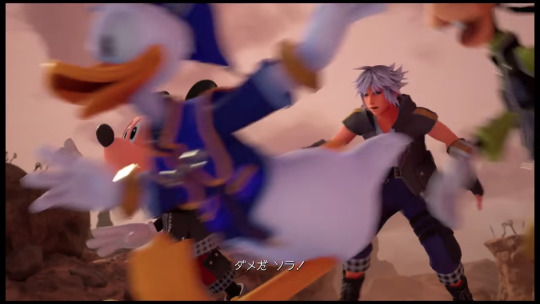
…as Mickey and Riku reach towards Sora:
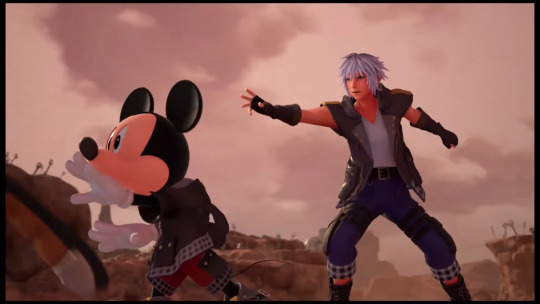
The camera then cuts to Kairi. We’re shown a shot from Terranort’s POV, and the high angle emphasizes her vulnerability. Note the fear on her face as well. She’s exhibiting signs of shock here, much like Aqua and Ven did earlier:
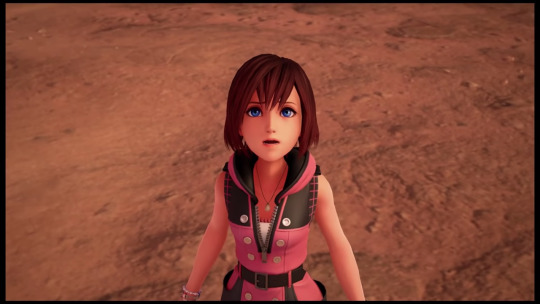
Till suddenly, out of left field (literally), Sora intervenes:
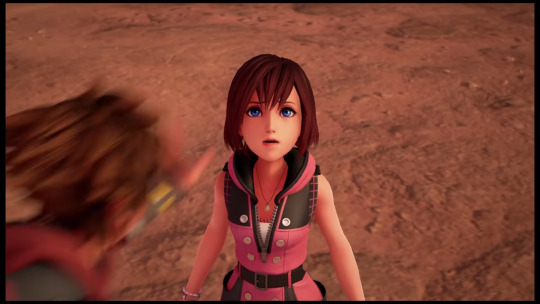
He’s just a blur of motion compared to Kairi’s relatively stable form:

Notice how she staggers backwards a little under the impact of his weight as he throws his arms around her:
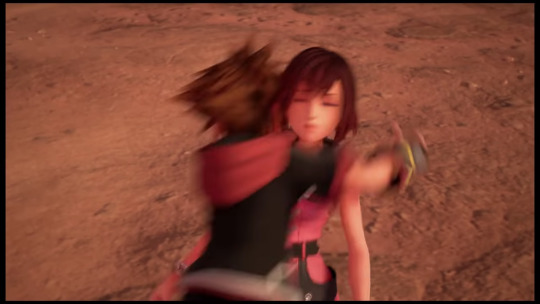
Then he buries his face in her shoulder and clings to her. He knows he might die, he knows at the very least he’ll get seriously injured. After all, he’s about to take the blow that Terranort means for her. But he doesn’t care, so long as he gets to die holding her:

I’ve seen him get criticized for not using his Keyblade here, but the thing is… he tried. Lea tried. It didn’t work. And magic for Keyblade wielders at least seems to be tied to wielding the Keyblade or some sort of weapon, so that probably wasn’t an option, either. All he had left, all he could do to keep Kairi safe, was shield her with his body. Which he does:

This is a Sora so terrified of losing her that he regresses to a scared child clinging to her for dear life. That’s all he can do, hold her as he awaits the inevitable. He’s acting on instinct here more than anything, and his instinct is to latch onto the closest source of comfort in his final moments.
You can see how wide her eyes are here, indicating her shock and surprise that he’s really here. Note how her arms are sort of hanging in the air because she’s not entirely sure what to do with them yet:
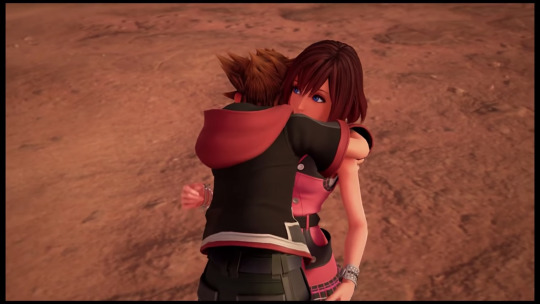
This hug is very similar to similar hugs they’ve shared in the past, so let’s talk about the parallels.
In KH1, Kairi was the one who hugged Sora to protect him from the Heartless. Note how she closes her eyes as she does:

And note how similarly her body is positioned to Sora’s in KH3. They both wrap their arms around the other person’s neck/shoulders and lean over the hug-ee’s shoulder because of height differences:

Then, of course, Sora hugged her back and thanked her once he was human again:
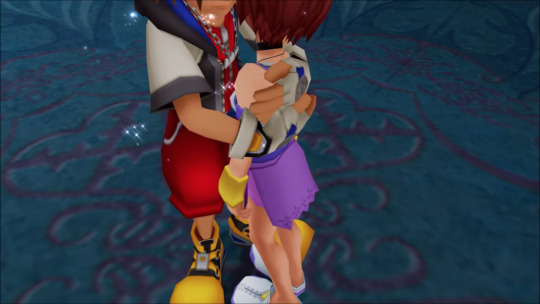
For the KH1 hug, we only got to see Kairi’s reaction…
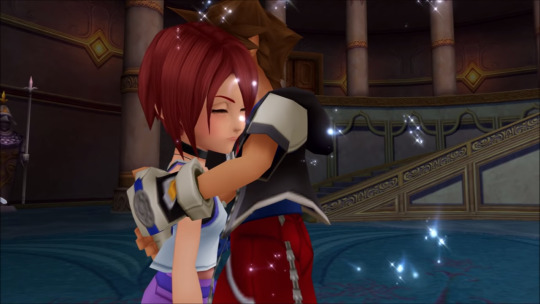
…until KHUx released a medal that showed Sora’s face during the hug:

In the KH3 hug, we likewise don’t see Sora’s face up close in the game itself. The next post will talk more about some of the shots we do see of his reactions during this part, but they’re from a further distance to show the rest of the action going on in the meantime.
Now, on to their reunion hug in KH2. The element of surprise comes to the forefront here. Sora, filled with guilt at not keeping his promise to return to Kairi, begins to apologize when she suddenly hugs him:

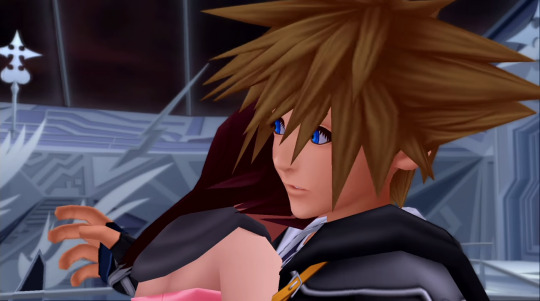
Note how similar his reaction is to Kairi’s at getting suddenly hugged in KH3:
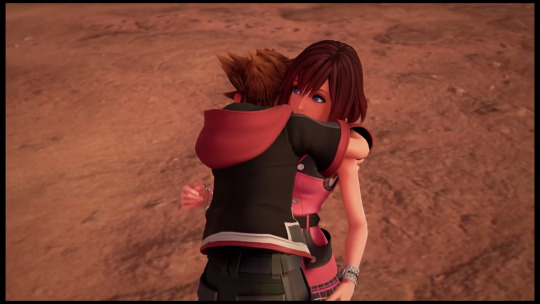
The visual parallels immediately come to the forefront - both of them have their eyes wide in shock, right hand held out because Sora doesn’t know what to do with his yet in KH2 and Kairi doesn’t know what to do with hers yet in KH3. This parallel serves as a callback to KH2, to remind the audience of what happened then, only this time the roles are switched. This time Sora is the one hugging her.
Then, after Kairi says to herself, “This is real…”

…and closes her eyes like she did for their KH1 hug…
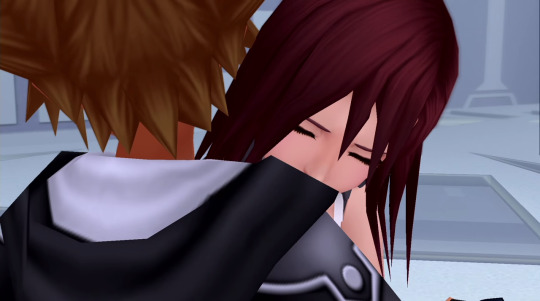
…Sora gives her a look of compassion…

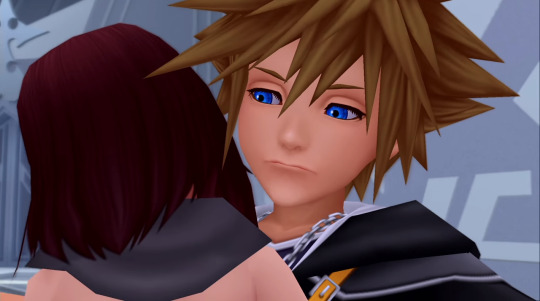
…and likewise closes his eyes as hugs her back:
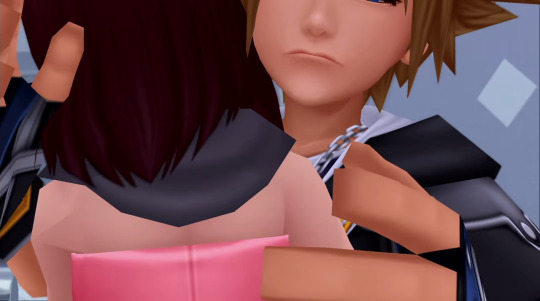


The KH3 hug, in just a few moments, manages to remind the audience of their previous hugs and in doing so adds greater emotional weight to the scene:
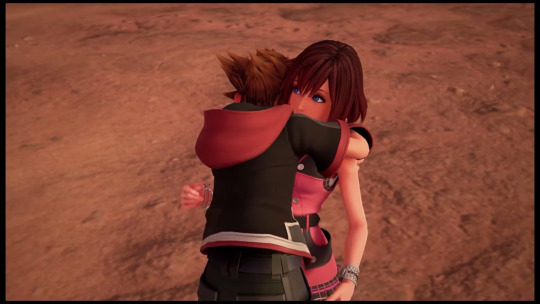
Sora is acting like he’s doomed here, much like Kairi thought she was in trouble when she protected him in KH1. But is he really? Find out in the next post about Donald and Goofy’s epic counterattack!
To be continued…
#kingdom hearts#sora#kairi#sokai#kh3#kingdom hearts 3#kh3 spoilers#kingdom hearts 3 spoilers#kh translation#kh analysis#kh meta#phoenix plays kh3#phoenix translates#long post#redhead duo#ginger duo
259 notes
·
View notes